最新人教版高一至高三全部英语课文朗读与听力MP3链接
新人教高一英语必修一 课本听力与视频材料原文Unit 4

新人教高一英语必修一课本听力与视频材料原文Unit 4Natural DisastersListening and SpeakingNews report 1Good morning, it's 17 April. A strong earthquake hit Ecuador yesterday. The 7.8-magnitude earthquake damaged many buildings, and early reports said that about 230 people were killed and more than 1, 500 were injured. V olunteers and rescue workers are helping the survivors News report 2Good evening. Today is 27 March. More news about the floods in central China. The government is helping more than 12,000 people in Hunan and Jiangxi get away from the rising water. Homes and land have been destroyed, but no one has been killed. Rescue workers and soldiers are working day and night to make sure that people are safe. They are also bringing food and water to those whose homes were lost in the disaster.News report 3Breaking news, Saturday 12 August. A tornado was just seen in southern Memphis. Eyewitnesses said that at 9: 25 a.m., the tornado destroyed four homes. A police officer tells us that at least one person has died. More tornados are possible, and the police advise avoiding the area.News report 4And in Seoul, a landslide damaged a library and a supermarket in a southern neighbourhood. The landslide was caused by the heavy rain that has fallen in Seoul over the past week. According to the police no one was injured in the landslide, but several cars were damaged. Those are the top news for today, Wednesday 21 July.Listening and TalkingTeacher: Thank you, Mrs Fors. That was a great presentation! Class, do you have any questions for Mrs Fors?Student 1: Mrs Fors, I think you're a hero. And Lucky is very cute, I’d like to know what we can do to prevent natural disasters.Ms Fors: Well, there's no way to prevent earthquakes and storms. But if we prepare, we can keep them from becoming disasters that kill or injure people. To be ready, we should make a safety list of what to do, where to go, and who to contact.Student 1: So what should we do if there's an earthquake?Ms Fors: Remember to "drop, cover, and hold on" Drop down onto your hands and knees, cover your head with your hands, and stay away from glass, windows, or anything that could fall. You could find cover under a desk or table. Hold on to the desk or table so it doesn't move away from you.Teacher: What should we do if we're outside when an earthquakehappens?Ms Fors: Go to an open space away from buildings, trees, or power lines.Student 2: And what about after an earthquake?Ms Fors: Well, if you' re trapped, you can use a cell phone to call or text for help. You can also tap on a pipe or a wall, or whistle for help. That way Lucky and I can find you!Student 2: I have a question for Lucky. Do you like being a rescue dog?Ms Fors: Lucky, what do you say?<Sound of dog barking twice>Teacher: I think he says he's a lucky dog.<They laugh>video TimeTsunami: Killer WaveThe warnings are few. The signs are sudden. The ground shakes. The tide goes into reverse. A great roaring sound fills the air. And then… It strikes. Wave after wave of crashing, crushing water. And when it is over, nothing is left.A tsunami. The word in Japanese means "harbour wave". Japan has been hit by many tsunamis in its history, as a result of its location. It liesacross the edges of 4 tectonic plates地壳板块, Most earthquakes are born in such places. When two tectonic plates push together, the earthquake sends enormous amounts of energy up through the ocean. A series of waves expands in all directions. In deep water. These waves travel fast—up to 500 miles an hour—but reach a height of only a few feet. A passing ship may not even notice them. But as the waves enter shallow waters and come into contact with the ocean floor, their speed is reduced but their height is raised. As they move onto land, the waves can rise as high as a 10-story building.A tsunami wave doesn’t break like an ordinary wave, Instead, it advances like a wall of water, crashing over everything in its way, sometimes reaching more than a kilometre inland. More damage is caused when the wave moves back out to sea. It drags everything in its path underwater and out to sea. Most tsunamis have several waves. They arrive between 10 and 60 minutes after the first strike-just when survivors think the danger has passed.The deadliest tsunami ever recorded occurred in December of 2004. An earthquake off the coast of Indonesia caused a tsunami that rushed across the Indian Ocean and reached as far as the coast of Africa. Whole sections of cities were destroyed. More than 200 000 people died. Most had no way of being warnedFive thousand miles away in Hawaii, scientists at the PacificTsunami Warning Centre monitor the earth's movements 24 hours a day. They hope to prevent a similar disaster from happening in the Pacific region. If they discover a quake big enough to cause a tsunami, the scientists try to find out where the wave will head and warn people in its path. Their advice is simple: leave the coastal areas and move to higher ground. Wait for news that the danger has passed. And be ready to deal with the damage that a tsunami leaves behind.。
高一英语听力录音原文

Text1.M: Look out of the window. It seems it’s going to rain soon. W: I quite agree. It’s been fine for two weeks. I’m so glad it’ll finally rain.Text2.W: Who is your best friend, Tim or David, Ted?M: Tim and David are just my roommates. My best friend is Sam. We’ve been friends for over ten years.Text3.M: It’s pretty hot today. What about going swimming tonight? W: I’d like to, but I can’t. I’ve an important exam tomorrow. I haven’t prepared well for it.Text4.W: Jim, you don’t look all right. What happened?M: I’ve been looking for my dog everywhere, but I cannot find her. Could you help me?Text5.M: Mr Brown will give a lecture this Friday. What about going to it?W: I’ve heard about it and that’s what I’m going to do the day after tomorrow. I am really interested in protecting the earth. Text6.M: Hi, Sara. Have you bought a train ticket to New York?W: No. I was about to buy a train ticket when John stopped me. M: Why?W: You may not believe it, but he is going to New York this Sunday, too. He’ll give me a lift.M: It’s really a long trip. I’m afraid John will feel tired on the way.W: Don’t worry. I can drive, too. We can talk and listen to music. I’m sure it’ll be fun.Text7M: Jenny, where are you from?W: I’m from England, but I wasn’t born there. I was born in China, where my mother and father met.M: What were they doing there?W: My father was teaching English there and my mother was dancing at a theatre. One day, my father went to watch a show and they met.M: Was it first—sight love?W: You bet. They got married in the following year. One year after they got married, I was born.M: So how long did you stay in China?W: For about three years. What about you?M: I’m from Australia. I came to the US to visit a friend. But i fell in love with New York and decided to work here. So far I’ve been working here for almost five years.Text 8W: Charles, do you love playing football?M: Yes. I play it every Wednesday and Saturday.But it’s not my favorite sport.W: What sport do you like best then?M: I love playing basketball best.W: But I’ve never seen you play basketball.M: Well, I often play basketball with my friends in a gym. I play it every Monday, Thursday and Sunday.W: You really spend a lot of time playing sports. No wonder you look so fit.M: Thanks. Do you like doing sports?W: Not exactly. I spend most of my free time watching TV and listening to music.M: It seems you’re a coach potato. You really should spend more time exercising outdoors, or you’ll put on weight quickly. W: You’re right. I’ll start playing volleyball with my friends next week.Text 9W: Jack, it’s already 5:30 pm. What about going out to eat now? M: But don’t you think it’s too early for supper? We usually eat at 6:30 pm. Didn’t you eat much at noon?W: I ate at Mr. Lee’s this noon. But I didn’t really like the food. So I didn’t eat much.M: Why didn’t you like the food? Was it badly cooked?W: It looked very delicious. But it was too hot for me. You know, I don’t like hot food.M: Why not tell Mr. Lee about that before he started cooking? W: I don’t think it’s polite. I wasn’t the only one that was invited, after all.M: Who else was there?W: Sara and Lily. Diana was there, too. We’re all Anna’s close friends, you know.M: Why didn’t Anna tell her father you don’t like hot food?W: She doesn’t know it. We’ve never talked about it. Though we’re close, we don’t often eat together.M: Well, tell Anna about that next time, or you’ll starve again next time you go to eat at her home.Text 10.Hello, everyone. My name is Amy. Now I’ll tell you how I spend my day at school.I usually arrive at school at 8:20 am. While we are waiting for class to begin, my friends and I chat about what we did the day before. We begin our first lesson at 8:40 am. There are three classes in the morning before snack time. Each class lasts forty minutes. Morning snack time begins at 11:00 am. I usually bring a piece of white pizza. It’s topped with cheese instead of tomato sauce. I usually get a few minutes to play after snack time. Class begins again at 11:30 am. There are two lessons after we have snacks. Lunchtime begins at 1:30 pm. On Mondays, Wednesdays and Fridays, my grandpa picks me up and takes me home to have lunch. On Tuesdays and Thursdays, I eat at school. After lunch, I usually walk home with my friends.。
人教英语必修第一册 听力录音稿

人教英语必修第一册听力录音稿Unit 1 FriendshipPart 1: Listening Comprehension (略)Part 2: Listening and Vocabulary (听力和词汇)In this section, you will hear a conversation between two friends discussing the concept of friendship. Listen carefully and choose the best answer to each question.1. What is the main topic of conversation?A. School activities.B. Friendship.C. Hobbies and interests.2. How long have the speakers known each other?A. 3 years.B. 5 years.C. 10 years.3. According to the speakers, what makes a good friend?A. Similar interests and hobbies.B. A sense of humor and honesty.C. Academic achievements and success.4. What does the boy say about his friends?A. He has many friends but few close ones.B. He has a lot of friends but no close friends.C. He has few friends but they are all very close.5. What does the girl think about friendship?A. She believes friends are important but not necessary.B. She thinks friends are not important in one's life.C. She believes friends are essential for a fulfilling life.Part 3: Listening and Note-taking (听力和笔记)In this section, you will hear a talk about the benefits of having good friends. Listen carefully and take notes as you listen. Then, fill in the missing information in the summary.Summary:Having good friends is essential for our well-being. Friends provide emotional support, help us cope with stress, and make life more enjoyable. Firstly, friends are there for us during difficult times, offering a listening ear and a shoulder to lean on. They provide a sense of belonging and can boost our self-esteem. Secondly, friends play a crucial role in helping us manage stress. By sharing our concerns with friends, we can gain different perspectives and find solutions to our problems. Lastly, friends make life more enjoyable by sharing our interests and hobbies. Whether it's going to the movies, playing sports, or traveling, doing things together with friends can create memorable experiences.Part 4: Listening and Dialogue Completion (听力和对话补全)In this section, you will hear a conversation between two friends discussing their plans for the weekend. Listen carefully and complete the dialogue with the missing information.A: Hey, what are your plans for the weekend?B: I'm not sure yet. Do you have any ideas?A: Well, I heard there's a new art exhibition downtown. How about we check it out?B: That sounds interesting. What time does it start?A: I think it opens at 10 a.m. We can meet at the entrance around that time.B: Great! After the exhibition, do you want to grab some lunch?A: Sure, there's a new café nearby. We can try it out.B: Perfect! I'll see you on Saturday then.A: Looking forward to it!Part 5: Listening and Discussion (听力和讨论)In this section, you will hear a discussion about the role of social media in forming and maintaining friendships. Listen carefully and answer the following questions.1. According to the speakers, what are the advantages of using social media for making friends?2. How do the speakers feel about the depth of friendships formed through social media?3. What are the potential drawbacks of relying too heavily on social media for friendship?Please pause the recording and take some time to answer the questions.(略)This concludes the listening section of Unit 1. Take a moment to review your answers before moving on to the next activity. Good job!。
2019新人教版 英语选择性必修一 课本听力与视频材料原文(精校打印版)(1)

Unit1 People of AchievementUsing LanguageAnna Smith:H i, Dr Wang! Hi, Wang Lin! Did you hear? Elon Musk’s company just launched another rocket.Dr Wang: Elon Musk? Who's he?Anna Smith: H e’s the guy who founded a private space company, and also some other companies. The companies he founds are all really high-tech and futuristic. He’s made millions of dollars.Wang Lin: Oh, he must be a really smart guy, and so rich right now.Anna Smith: Y es, I’d say he’s as famous as Bill Gates or Jack Ma now. T hey’re really smart, too. Just think of all that money they must make!Dr Wang: Well, you two, it's great that they’ve been able to become so successful and make all that money, but money isn't everything. Just look at people like Alexander Fleming, who discovered penicillin,and Florence Nightingale, the founder of modern nursing, and my own personal hero, Dr ZhongNanshan, who managed the SARS outbreak—they never made millions of dollars, but theircontributions to health care have saved countless lives.Wang Lin:Yes, Dad, sorry. We know—they are great examples to everyone…But, you know, successful people like Bill Gates and Jack Ma have donated millions of dollars to charity, which should alsocount for something, right?Dr Wang: Well, you're right on that point. They’re certainly being responsible in that way. Moreover, they're good for working hard and becoming successful.Anna Smith: Yes, exactly! And Dr Wang, I think you misunderstood me just now. I agree with you. I like those people because they have worked so hard to achieve their goals and have positive contributions tosociety. It's not just due to how much money they make. Elon Musk, for example, is trying to helpthe future of humankind, and Bill Gates has given us home computers. I think we need morecreative people like them.Wang Lin: Well, don’t forget Jack Mas contribution. Without him, I wouldn’t find it so easy to shop online!And by the way,Dad, if we’re talking about people who do good things and inspire us—youinspire me, Dad…Listening and SpeakingHello. Today, I'd like to talk to you about my hero, Jane Goodall.Jane is famous for her observations of wild chimpanzees in their natural habitat. As a child, she always dreamt of studying animals, and when she became an adult, she finally got the chance.Goodall spent many years with chimpanzees in a Tanzanian national park. At first, the chimps mistrusted her and kept their distance, but eventually they saw her as harmless. Goodall did not follow traditional scientific research methods. She did not number the chimps, but rather give them names so she could see them as individuals. Goodall's work changed the way people thought about chimps. She was able to discover how they communicate, and gave us invaluable information on their social structure and culture. She discovered that they also ate meat, rather than just nuts and berries, and also that they were capable of making their own tools For more than 50 years, Jane Goodall has fought to protect animals, including setting up the Jane Goodall Institute in 1977. And in 1991, she set up the Roots & Shoots programme, which teaches young people around theworld how to protect the environment.Following her countless years of hard work, in 2002, Goodall became a UN Messenger of Peace. She serves as an inspiration to me. She inspires me through her love for the environment and her desire to educate young people. I hope you will find her an inspiration as wellThank you*Video TimeMei Lanfang-great Artist, Cultural AmbassadorThese beautiful performances belong to a special art form in China—Beijing Opera, in English often referred to as Peking Opera. Talking about Beijing Opera, we cannot forget to mention one of its greatest performers: Mei Lanfang, a brilliant artist who was instrumental in bringing Beijing Opera to the worldMei Lanfang was born in Beijing in 1894. He started to learn the art of Beijing Opera at the age of eight and made his on-stage debut at age eleven. Mei Lanfang worked hard to learn as much as possible from the great artists and masters of Beijing Opera, and by the age of 20, he had become a leading actor in Beijing Opera's dan role.Mei Lanfang quickly became well-known among Chinese audiences for his acting skill. His fame also began to spread around the world as international visitors to China saw his fascinating performances. The great Indian author Rabindranath Tagore was inspired to write a poem about the young actor after watching one of his performances.[Text on screen]You are veiled, my belovedIn a language I do not knowAs a hill that appears like a cloud behind its mask of mistMei Lanfang’s skill opened doors for him to become friends with people from all over the world, as he often entertained guests from other countries who wanted to meet the young actor. As Mei Lanfang got to know ambassadors, European royal families, and celebrities from abroad, he longed to bring his beloved Beijing Opera to the rest of the world, so that even more people from other countries might understand and appreciate the beauty of Chinese culture and art.And so, in 1919, Mei Lanfang began to travel abroad, giving performances in Japan and the Soviet Union. His tours were a great success; audiences were fascinated by this elegant opera from the Orient.One of Mei Lanfang's greatest goals was to visit the United States, and after eight years of attempts, he and his opera group finally brought Beijing Opera to the USA.Mei Lanfang and his group toured Seattle, Chicago, Washington, DC, New York, San Francisco, and several other large American cities, and received a warm welcome from city leaders and local celebrities wherever they went. American audiences loved the performances: In some cities, tickets for two weeks of shows were sold out in three days. Fans stood in long queues afterwards to shake his hand.Clearly, despite the language barrier, the beautiful, elegant performances were a huge success. One critic wrote, " This is the most wonderful and exciting night that I have ever spent in the theatre. ” Americas Pomona College and the University of Southern California both conferred honorary Doctor of Arts degrees on MeiLanfang for his great work in bringing Beijing Opera to the world and promoting cultural exchange between China and other countries.Mei Lanfang was and still is greatly loved, not only for his tremendous artistic skill but also for his great kindness to all people and his deep love for his country. Mei Lanfang had performed in Japan and helped the people there during the great Kanto earthquake, but when the Japanese military troops invaded China, he refused to do any performances for their entertainment.Mei Lanfang dedicated his whole life to the art of Beijing Opera. He constantly sought to improve his own artistry, creating many unforgettable and beautiful characters for the stage. His style became known as the "Mei Lanfang school”, a uniquely graceful style, and is still one of the most popular styles of Beijing Opera today Mei Lanfang died in 1961 of heart disease. During his more than 50 years on the stage, Mei Lanfang took traditions from the past and adapted the best parts to create new and enrich old forms of Beijing Opera. Although this great opera master has now joined the heroes of history, he left behind a legacy of cultural wealth for his people and for all future generations.Beijing Opera is now on the international list of art forms that make up the world's intangible cultural heritage, and is still enjoyed by young and old, men and women, around the world.Unit 2 Looking into the FutureUsing LanguageHost: On today’s episode of "Future Changes”, we talk with two experts from different fields, Dr Han and Vincent Black, to hear their predictions about the future. First, Dr Han, could you please tellour audience what you do?Dr Han:Certainly. I'm a computer scientist.Host:And could you please tell us your prediction?Dr Han: Yes, well, I forecast that computers will be cleverer than us in the future. I think that people will also be programming computers to think like humans.Host: That's very interesting, but aren't you worried that such computers would be dangerous?Dr Han:Not at all. This is because we’ll be programming them to not think in ways that may harm humans. In fact, we’ll also be creating machines to help people internally国内地. For example, Ithink scientists will put some small intelligent machines, called nanobots纳米机器人, inside ourbodies to increase our abilities.Host:Wow! That would make each one of us superhuman! And Vincent, could you please tell us about your job?Vincent Black: Certainly. I’m an architect. I design buildings.Host: And what is your prediction about the buildings of the future?Vincent Black: It's about the cities of the future, actually. I believe that cities floating on water are part of the world's futureHost: Oh, really? What might make us want to do that?Vincent Black: Yes. With global warming causing polar ice to melt, the sea level rising by many metres is a very realistic prospect. Instead of moving people away from the sea, I think that people could moveinto housing in cities that float.Host: That sounds very innovative. Could you please give us more details?Vincent Black: Sure. Well, I’ve developed a plan by designing a city that borrows many ideas from the giant water lily, a flower that floats on water. Moreover… .Listening and SpeakingYueyue:How did you get to be so smart?Huimin:Well, a lot of time went into research to make intelligent androids like me… Your move.Yueyue: How much time?Huimin:Hundreds of years. AI research first began in America in 1956... more than 350 years agoHuimin: Not really. It wasn’t until1997 that a computer finally beat the world’s chess champion, Garry Kasparov. That was IBM’s Deep Blue. Then in 2011, IBM’s Watson defeated some very clever humanopponents on an American quiz show. It won one million dollars, which was donated tocharity ...CheckYuevue: Check? What…?Huimin: Do you want me to make the game easier for you?Yueyue: Yes, pleaseHuimin:Then in 2017, a computer named Alphago beat the world's Go champion… Alphago is my personal hero. CheckYueyue: Easier... please!Huimin: Sure. Would you like some tea while you think about your next move?Yueyue:Yes. Milk, no sugar… That all sounds pretty impressive. I didn't realise AI was developed so ong ago Huimin: But things slowed down after 2017. Yes. there were AI computers that could drive cars way back then, but none of those machines were really...human. Then in the mid-21st century, Al computers were putinto robots—androids like me. But it took another hundred years for an android to write a novel. Thena hundred years after that, the first android became president of a count … Checkmate.Yueyue: In our next game, could you let me win?Huimin: Anything you say*Video TimeFlight Of The RobobeeNarrator: This is Robert Wood. He loves robotsRobert Wood: So I want to begin with a bold statement that robotics is the next Internet. It's the next big thing to impact our lives in areas from medicine to even things like space exploration. The more traditionalview of robotics is big, rigid, very powerful, very dangerous …but in this case we're making thingssmaller, perhaps faster, certainly cheaper than more traditional robotic systems. We areconstructing robots the size of insects. We use nature to inspire the robots that we build. This is of acarpenter bee. And as an engineer, I can look at this and start to ask some really well-posedquestions, you know like "how are the wings moving?”Our team is working on creating a colony of autonomous robotic bees[Text on screen]Robobees are autonomousThey can fly independentlyRobert Wood: We envision this, twenty or so years down the road, when these things actually exist, they can be quite useful for applications where you wouldn't want to put a human or an animal—hazardousenvironment exploration, search and rescue, space exploration, assisted agriculture…[Text on screen]The tiny robots will help explorers, doctors, and even farmersRobert Wood: There's all these really interesting open questions that must be solved if you’re gonna achieve this goal. We have to build everything from scratch从头做起. How many Robobees have we crashed?Ah, all of them! We build, we test. We build, we test. If you don’t fail, you don't learn enough.For everything that works, there's tens or hundreds of things that don't[Text on screen]Robobees work together like real beesJust like real bees, every Robobee has a iob to doRobert Wood: Now you have this concept where you have not just one all-capable robot, but you have a bunch of not very good robots. The idea is that the whole is greater than the sum of the parts.[Text on screen]If you want to make something fly, a solution already exists in nature—Robert WoodUnit 3 Fascinating ParksUsing LanguageYuhui: Now that were at the park, where would you like to go first, Jake?Jake: I don’t know. What interesting things can we see and do here?Yuhui: Well, Flower Land, fountain performances, children’s rides…Oh! This is interesting—here's an underwater corridor.Jake:That does sound interesting. How do we get there?Yuhui: Let me check the map on my phone... From here, we should go north, and then turn left and follow the main road until we reach the second path on the right. Then we turn right on the path and follow it for about three hundred metres until we come to an intersection with a washroom. Then we should turn left on another path. After about 150 metres, we’ll be at the underwater wetland corridor.Linlin: Oh. that sounds a bit far!Jake Well, maybe we can rent bikes to get thereYuhui:No, we can’t. There are four-wheel cycles, but they are only allowed on certain fixed routes. Let me check the map again ... Oh, we're actually very near the cycle rental place now. We could go there first, if you like.Linlin: Yes, OK, it would be fun! Hopefully we can get close to the underwater wetland corridor, and I’d also like to take a pedal boat on Wali Lake afterwards.Jake: Sounds like we've got a lot of things to doYuhui: Yes, so we’d better get started.Listening and SpeakingDavid Evans: Here's a park map. Where should we start?Li Y ang:I don’t get it. I thought this park was about Polynesian culture, but the park map shows six different culturesDavid Evans: Well, though the people of Polynesia are all related, Polynesia is made up of several different cultures spread out across the South Pacific.Li Y ang:Oh. I see. So what can we do here?David Evans: For a start, we can take a canoe tour of the park.Li Y ang:Canoe? What's that?David Evans: It's a small boat. Traditional canoes are carved from a single tree, so they are often quite narrow.The Polynesians used canoes to travel thousands of kilometers.Li Y ang:That’s interesting. Where do we go to find them?David Evans: Well, to get to the canoes, we need to go straight. Then after we cross the bridge, we turn left.They should be quite near there …Then after the canoes, we can learn how to make fire thetraditional way, using sticksLi Y ang:Where can we do that?David Evans: The guide says we should go to the Samoan Village. That shouldn't be very hard to find. From the canoes, we just go straight, and then take the bridge on the right. It should be a short walk awayon the left. Oh, and next to the Samoan Village is the Aotearoan Village. We can get Maoritattoos刺青,纹身there.Li Y ang:Maori tattoos?David Evans: Yes. The Maori like to tattoo their faces with interesting designs.Li Y ang:But I don't want to tattoo my face.David Evans: Don’t worry! It's not a real tattoo. We can wash it off later.Li Y ang:Cool! But first, the canoe tour.David Evans: Yes! I can’t wait. Let's go.* Vdeo TimeBioblitz: Life in 24 hoursNarrator:Welcome to Rock Creek Park. It's a big park in the middle of Washington DC. Today, this park is going to be the site of a big research project. Dozens of scientists from around theUnited States along with hundreds of volunteers are here for something called a Bioblitz.In a Bioblitz, teams of scientists, parents, kids, and volunteers all go to a park and look forexamples of everything that's alive there. They work in teams to count every living thingthat they find from the big animals like deer and rabbits to tiny plants. But they only have24 hours o do it. Dr Stuart Pimm, an ecologist from Duke University, is certainly excitedabout the event. He studies biodiversity.Dr Pimm:The extraordinary thing about this Bioblitz is just how much stuff there is here! This is really where the wild things are. There really is a huge amount of stuff in this city park Narrator:Park rangers are there to help. Here, they are helping a group to catch caterpillars毛毛虫, spiders, and butterflies. Insects are an important part of the Bioblitz. One reason is thereare a lot of them. They also come in a great variety of colour, shapes, and behaviours. It'seasier to see how special they are when you look at them close up. Photographer DavidLittschwager usually takes photos of endangered species, but at the Bioblitz he's takingphotos of insects.David Littschwager: We see a lot of pictures of lions and tigers and bears but you don’t often see a portrait of a spider nice and close. Some people don't like spiders, but I have great affection for them.But I like them to stay on the glass.Narrator Littschwager worked all night taking pictures, but he wasn’t the only one who didn't sleep.People had only 24 hours to find all the living things in the park so all the participantsworked hard until the final minute. And even at the end, there were a lot of plants andcreatures that they couldn’t identify. The real purpose of the Bioblitz is to get peopleinterested in the biodiversity生物多样性that’s all around them even in their own backyards.So, what are you waiting for? The clock is ticking. Isn't it time to start counting the livingthings in your backyard?Unit 4 Body LanguageReading and ThinkingSMILE TRIALDo you think you are able to pick out the fake smile?If you picked the one on the left, you're correct.Okay. let's try another round. Which smile is fake?Surprised? It's harder than you thought, right?If you didn’t get these correct, you're not alone. We wanted to see if the average person could spot a fake smile, so we brought this game to the park“That one's fake.” And found that people only get it right about half the time.“Yeah. I think that one's real.”“It’s really hard to tell.”“Yeah. I don’t know.”“Unless you know how smiles actually work. There is a term, okay? It's called the Duchenne Smile. Duchennne Smile means it's a real smile. A real smile involves the muscles around the eyes being a part of the smile.”Guillaume Duchenne was a French scientist who wanted to learn more about facial expressions so he used electrical stimulation to create a fake smile. Then he compared it to a real one by telling his subject a joke and the difference was striking. What he discovered is that a real smile causes the muscles around your eyes to contract, creating tell-tale crinkles.Now that you know the trick, let's see if you can pick out the fake smile.Which smile is real? The right, or the left?The eyes are a dead giveaway, right? The smile on the left is genuineWanna try another one?What do you think? See how the skin around the eyes scrunches up involuntarily? The left smile is real. Okay, one more. But it's a little trickierWhich smile is real? The right or the left?Can you see how the skin around her eyes wrinkled up just a tiny bit more on the right? That's the real smile.It's not surprising that real and fake smiles activate two different parts of the brain. A real smile involves the areas of the brain related to emotionUsing LanquaqeWoman: What were you doing just now? What did those gestures mean?M an: Oh, I was just telling my friend over there to meet me for lunch down the street in twenty minutes. Woman: Oh, I get it, so you were sending him secret hand signals.Man: Yeah, we got the idea from an action movie last night and decided to try it out for fun. In the movie, the police were trying to enter a house, but they had to be really quiet so they could take the criminals by surprise. So, the police leader used hand gestures to tell his team what to do. For example, he used this gesture to tell them how many bad guys were in the house. Then he gave instructions on who should go where, and what they should do. I thought it was pretty cool how they used hand gestures to communicate.Woman: Well, you know, you can say a lot without speaking. I’ve been taking acting classes, and right now we’re learning how to use body language to express ourselvesMan: Wow, that's cool So you mean you're not allowed to talk, right?woman: Yes, and it's really difficult if they want you to express something complicated without saying a word.But I'm slowly getting better at it, I guess.Man: That reminds me of those Charlie Chaplin movies. I guess it's not easy to tell a whole story only using body language.Woman: Yeah, he was a real master. Everyone in my class loves his movies. We actually had to watch some of his movies and act out some scenes. I was such an amateur!Man: Well, it's good you tried. Now, by your body language, I can tell that you want to buy me lunch tomorrow. Am I right?Listening and SpeakingWoman: Today we are interviewing Max Snelling, who wrote a book about body language in the animal world.Hello, MaxMan: Hello.Woman: In your book you talk about how animals use body language the same way as people do.Man: That’s right. This is true of many animals. However, it is especially true of chimps.Woman: I n what way?Man:Well, when we humans are worried or frightened, we sometimes smile in a nervous way. Chimps also look as though they are smiling when they are nervous.Woman: Why is that?Man: Perhaps they are trying to look friendly so an enemy will not hurt them. Now, what do we often do when we are angry?Woman: We stand tall and put our hands on our sides. Sometimes we shout.Man: Exactly. We want to look bigger and stronger. Chimps do the same thing—they stand up, move their arms around, throw things about, and make noise.Woman: Just like we do.Man: That's rightWoman: What about in family relationships?Man: That's very interesting. Both chimp and human mothers hold their babies and kiss them. A similar thing is true for adults. To show that we accept and love each other, among our main expressions are hugging and kissing. When a stronger chimp frightens a smaller chimp, the smaller chimp will hold his head low.The bigger one will then touch him or kiss him to make him feel safeWoman: So chimps are just like people!Man:Or, were just like chimps.Unit 5 Working the LandUsing LanguageHost: Good morning, listeners. Today is World Food Day, and David Bond from the UNS FAO is here to talk to us about world hunger. Welcome, David! Please explain what the FAO is and what its alms are.David: Good morning. For those who don’t know, FAO stands for Food and Agriculture Organisation. And our aim is simple—to eliminate world hunger, which, according to our latest figures, stands at around 11% of the world's populationHost: So I guess things like droughts, floods, and climate change are all major factors in this.David: Yes, that’s right, they can all seriously affect crop production. And another factor is poverty. There is strong evidence to suggest that many people just can’t afford to eat well. And it's not just about having enough food to eat; people need to eat enough nutritious food, which often they cannot afford or do not have access to. The FAO believes everyone should have the right to healthy food.Host: And what about war? I’ve seen many researchers say that it directly leads to mass hunger.David: Absolutely true. Our research indicates that wars can heavily affect food production and transportation, meaning that millions of people have to go hungryHost:So what can we do to alleviate world hunger?David: Well, the UN is making efforts to reduce climate change, and the FAO runs a project called Climate-smartAgriculture, which helps countries to develop sustainable agriculture. However every country needs to focus on making new achievements in agriculture, too, which can often benefit the whole world. Like China, for example, whose development of hybrid rice has greatly increased rice production in many other countries. And, of course, global conflict must be eliminated. And don’t forget that we as individuals can also make a difference: buy food that supports the environment, and never waste food. Host: David Bond, thank you very much. Just a quick message to our listeners: you can find more information on world hunger on the FAO website…Listening and SpeakingNews Report IToday, in agricultural news, we are sad to report the passing of Professor Li Baoguo. Li, a well-respected professor at Hebei Agricultural University, died of a heart attack on 10 April at the age of 58. Besides teaching at university, Professor Li spent more than 30 years working to make the Taihang Mountains green with many different types of trees. This has had a direct impact on the lives of more than 100,000 local farmers, who have been able to escape poverty through the regular harvesting and sale of their produce, such as apples and walnuts. Though he had a short life, he will be greatly remembered as an agricultural reformer by the thousands of farmers whose lives he had helped.News Report 2In other news, the first commercial vertical farm has been built in the UK. In a vertical farm, crops are produced in a greenhouse in large trays stacked one above the other. With the growth of cities, farmland has become increasingly rare. Meanwhile, many countries lack enough farm workers to grow the crops they need. The vertical farm built by Intelligent Growth Solutions near Dundee solves both these problems. Not only does it use space efficiently, but the farm is fully automated, and uses low amounts of energy and water. At the moment, the farm produces just salad leaves and herbs. However, future plans include tomatoes and cucumbers.News Report 3Finally, the East African Farmer Innovation Fair has just ended in Kenya. The fair’s aim was to encourage innovation among farmers throughout the region. At the end of the fair, the host country’s Gerald Kibugi won an award for the creation of his software, Green House Do It Yourself. This software allows farmers to look up information on how to use greenhouses. “Farmers do not have the time to read and apply the lessons learnt from books on greenhouse farming, which is why I developed this software.” said Kibugi. Now with this program, all the information farmers need about greenhouses is just a mouse click away.*Video TimeEarth UniversityNarrator: Class is in session. But this isn't a typical college campus. This is Earth University Earth University is a unique agricultural school in Guacimo, Costa Rica. According to universitypresident Jose Zaglul, the school's goals are to give poor students an education and to teachthem skills to protect the environment. Here, students learn sustainable farming methods.These methods have little or no negative impact on the environmentGaspari Cordova: They teach us here how to be very respectful to our environment. Not only to the people that。
人教版高中英语听力(全日制必修)高三:UNIT1-3
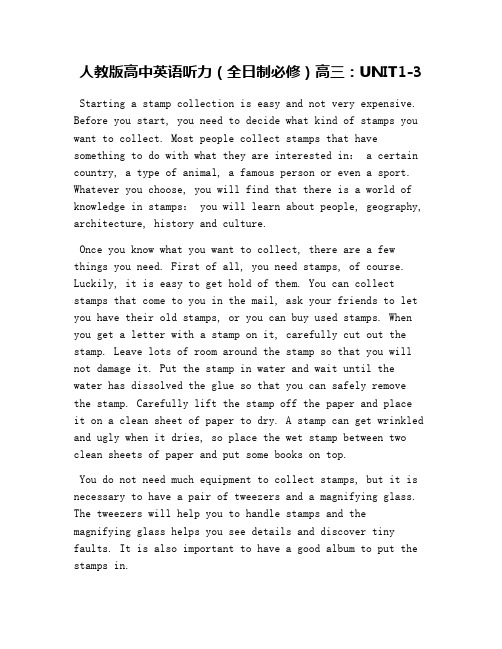
人教版高中英语听力(全日制必修)高三:UNIT1-3Starting a stamp collection is easy and not very expensive. Before you start, you need to decide what kind of stamps you want to collect. Most people collect stamps that have something to do with what they are interested in: a certain country, a type of animal, a famous person or even a sport. Whatever you choose, you will find that there is a world of knowledge in stamps: you will learn about people, geography, architecture, history and culture.Once you know what you want to collect, there are a few things you need. First of all, you need stamps, of course. Luckily, it is easy to get hold of them. You can collect stamps that come to you in the mail, ask your friends to let you have their old stamps, or you can buy used stamps. When you get a letter with a stamp on it, carefully cut out the stamp. Leave lots of room around the stamp so that you will not damage it. Put the stamp in water and wait until the water has dissolved the glue so that you can safely remove the stamp. Carefully lift the stamp off the paper and place it on a clean sheet of paper to dry. A stamp can get wrinkled and ugly when it dries, so place the wet stamp between two clean sheets of paper and put some books on top.You do not need much equipment to collect stamps, but it is necessary to have a pair of tweezers and a magnifying glass. The tweezers will help you to handle stamps and the magnifying glass helps you see details and discover tiny faults. It is also important to have a good album to put the stamps in.For most collectors, the joy of collecting and learning about the items is the most important, but collections can become worth a lot of money. A collection becomes valuable if it is complete, that is, if it includes all the items in a series, or if it contains rare items. Stamps can also become valuable if there is something wrong with them. A Swedish stamp, issued in 1855, was printed on yellow paper instead of the green paper that should have been used. As a result, a stamp that had only cost a few pennies became worth millions of dollars. The only existing copy of the stamp was found by a young boy looking through his grandfather's collection. The stamp was sold to a collector in 1996 for $2.3 million!Collecting coins is not quite as easy as collecting stamps, but beginners can start by going through the change in their pockets, that is, collect coins which are in circulation. Someone who wants to start a collection can also contact a club for coin collectors or ask a relative or a friend who collects coins. Experienced collectors usually have more than one coin of a certain kind and will not mind sharing the extra ones. They can also provide helpful advice about where to buy old or rare coins. Most collectors begin by collecting coins from their own country. A collection can be built around any theme, but coin collectors often arrange their collections based on where and when the coin was made.As with stamps, you do not need a lot of special tools or equipment. You do need a safe place to store the coins. There are inexpensive albums that will protect your coins whilestill allowing you and your friends to enjoy them. You can hold the coins with your bare hands, but you should wear gloves if it is a valuable coin. Never touch the face or backof a coin. The dirt on your fingers will destroy the surface of the coin. Nor should you ever clean an old coin -- if you do, the coin will lose its value. You can clean ordinary coins if you wish: copper coins can be cleaned with vegetable oil and silver coins with common soap. After cleaning the coins, wipe them with a clean cloth. Never use any strong or dangerous chemicals.Perhaps the most valuable coin in the world is the 1933 "Double Eagle". The coin was first issued in 1850 and was made of gold from California. The coin was changed in 1907 and was used until 1933, when the American government decided to take the country off the gold standard. People were no longer allowed to own the coin, and all the coins were brought back to the bank, where all but two were destroyed. The two coins that were left were kept in a museum. Some coins were stolen, but all of them were found by the police -- except for one! The last "Double Eagle" remained missing until 1996, when police officers managed to get the coin back in a secret operation. The government allowed the coin to be privately owned and it was sold to a collector for 7.5million dollars.。
新课标人教版高中英语听力下载

英语听⼒频道为⼤家整理的新课标⼈教版⾼中英语听⼒下载,供⼤家参考:)R=reporter M=manR. What was the first thing you remember? M. Oh, my goodness. It was about 5 o’clock in themorning. I remember, I woke up when I wasthrown out of the bed. When I tried to walk,the floor shook so that I fell. I felt terrified andrushed downstairs.R. What did you see outside?M. Oh, I saw things I never want to see again. It seemed as if the end of the world came. People were crying, shouting and running everywhere. Bricks were falling down from some buildings while big ones were shaking...... Lots of people were getting buried under bricks. There were great fires around us. It was terrible.R. Did you realize what was happening? M. No. I asked a man standing next to me what happened. Before he could answer, some bricks fell on him and he was killed.R. That sounds frightening. Did you know whereto find a safer place?M. Oh, no. Luckily I met a man who knew theway to a boat.R. So.... you got away easilyM. No, we didn’t. It was difficult becausethe streets had deep cracks. As we were carefully picking our way, some frightened cows rushed up Market Street and dropped into one of them. I’ll never forget the noise they made. Some ofthem had broken their legs and others were climbing upon each other to get out. Horrible.R. How did you feel once you’d left the第2/3页city?M. Umm. I felt safer because we werebeingcared for. The soldiers saved us. They brought us water and food. Thanks to them many of us are still alive.。
人教版英语必修一原文听力
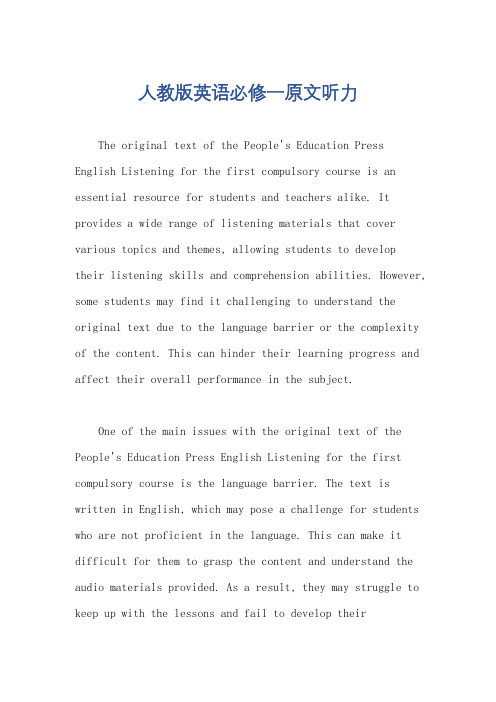
人教版英语必修一原文听力The original text of the People's Education Press English Listening for the first compulsory course is an essential resource for students and teachers alike. It provides a wide range of listening materials that cover various topics and themes, allowing students to developtheir listening skills and comprehension abilities. However, some students may find it challenging to understand the original text due to the language barrier or the complexity of the content. This can hinder their learning progress and affect their overall performance in the subject.One of the main issues with the original text of the People's Education Press English Listening for the first compulsory course is the language barrier. The text is written in English, which may pose a challenge for students who are not proficient in the language. This can make it difficult for them to grasp the content and understand the audio materials provided. As a result, they may struggle to keep up with the lessons and fail to develop theirlistening skills effectively.Another problem with the original text is the complexity of the content. The listening materials cover a wide range of topics and themes, some of which may be unfamiliar or difficult for students to comprehend. This can make it hard for them to follow along and extract the key information from the audio materials. As a result, they may feel overwhelmed and discouraged, which can impacttheir motivation and engagement with the subject.Furthermore, the original text of the People's Education Press English Listening for the first compulsory course may not cater to the diverse learning needs of students. Each student has their own unique learning style and pace, and the one-size-fits-all approach of theoriginal text may not effectively address these individual differences. This can result in some students feeling left behind or disengaged from the learning process, as they struggle to connect with the materials provided.In addition, the lack of supplementary resources orsupport materials accompanying the original text may also pose a challenge for students. While the listening materials are valuable, students may benefit fromadditional resources such as vocabulary lists, comprehension questions, and listening exercises to reinforce their learning. Without these supplementary materials, students may struggle to fully grasp the content and apply their listening skills in a meaningful way.Overall, the original text of the People's Education Press English Listening for the first compulsory course presents several challenges for students. From the language barrier to the complexity of the content and the lack of supplementary resources, these issues can hinder students' ability to develop their listening skills effectively. As such, it is important for educators to consider these challenges and explore alternative approaches to support students in their English listening learning journey. By addressing these issues, educators can help students overcome the barriers to their learning and create a more inclusive and supportive learning environment.。
人教版高中英语必修一高中一年级()Unit4Earthquakes(含答案解析及听力mp3)

高中英语学习材料(灿若寒星*制作整理)人教版新课标高中一年级(必修一) Unit 4 Earthquakes 第一部分 听力(共二节,满分30分) 第一节 (共 5 小题; 每小题 1.5 分,满分 7.5分)听下面听下面5 段对话,每段对话后有一个小题,从题中所给的A 、B 、C 三个选项中选出最佳选项,并标在试卷的相应位置。
听完每段对话后,你都有你都有10 秒钟的时间来回答有关小题和阅读下一小题。
每段对话仅读一遍。
一小题。
每段对话仅读一遍。
1.What does the woman plan to do during the summerA.To teach.B.To stay at home and rest.C.To go to China for a visit. 2.What did the woman buy her husband for Christmas ?A.A book.B.A watch.C.A case for coin collection. 3.What does the man intend to doA.He intends to put something into the boxes.B.He intends to ask the woman to help him carry boxes.C.He intends to help the woman carry boxes. 4.What does the woman mean ?A.She doesn A.She doesn’’t agree with the man.B.The man shouldn B.The man shouldn’’t eat the fish.C.The fish is safe to eat. 5.How much will the woman lend the man ?A.$6 .B. $4 .C.$7. 第二节(共15小题; 每小题1 .5分, 满分22.5分)分) 听下面5段对话或独白。
新人教版高中英语选修一Unit2听力材料 (打印版)

新人教版高中英语选修一Unit2听力材料
(打印版)
Unit2听力材料包括了多组对话和独白,主要涉及到时间管理、研究方法和校园生活等内容。
以下是每一部分的简要描述:
对话一:时间管理
对话中,两个人讨论了如何合理安排时间来完成研究任务和参
加课外活动。
他们提到了一些时间管理的技巧,如做好计划、合理
分配时间以及减少社交媒体的使用等。
最后,他们决定每天制定详
细的研究计划并互相监督。
对话二:研究方法
这组对话中,两个人分享了一些他们在研究中的经验和技巧。
其中包括制定研究目标、使用记忆法和找到适合自己的研究方式等。
他们还强调了练和复的重要性,并鼓励彼此互相研究和交流。
对话三:校园生活
在这个对话中,两个人讨论了校园生活中的一些常见问题,如
参加社团、遇到困难时该如何求助老师等。
他们提到了加入社团能
够帮助拓宽兴趣爱好和锻炼能力,同时也强调了互相帮助和团队合
作的重要性。
独白:自室规则
这段独白介绍了自室的规则和使用注意事项。
其中包括保持安静、合理使用自室设施和材料、不吃零食等。
独白还提到了自室是
一个优秀研究的环境,希望大家能够利用好这个资源。
以上是新人教版高中英语选修一Unit2听力材料的简要描述。
听力材料中涉及到了时间管理、研究方法和校园生活等方面的内容,对于学生们合理安排时间、提高研究效率和适应校园生活都具有一
定的指导意义。
以上。
人教版高中必修一英语听力材料
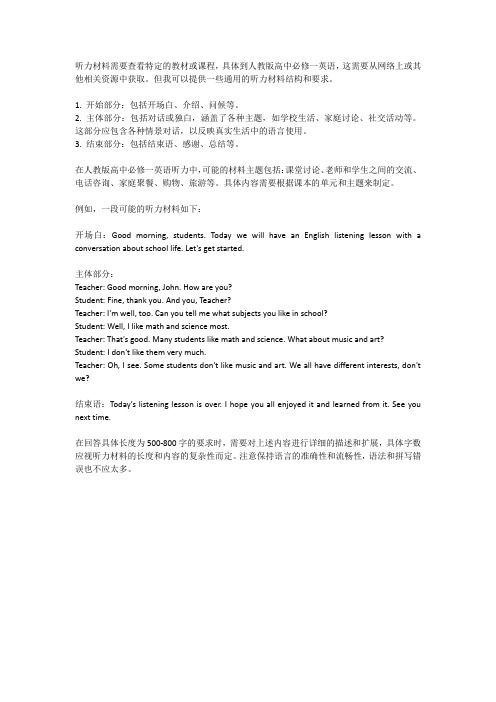
听力材料需要查看特定的教材或课程,具体到人教版高中必修一英语,这需要从网络上或其他相关资源中获取。
但我可以提供一些通用的听力材料结构和要求。
1. 开始部分:包括开场白、介绍、问候等。
2. 主体部分:包括对话或独白,涵盖了各种主题,如学校生活、家庭讨论、社交活动等。
这部分应包含各种情景对话,以反映真实生活中的语言使用。
3. 结束部分:包括结束语、感谢、总结等。
在人教版高中必修一英语听力中,可能的材料主题包括:课堂讨论、老师和学生之间的交流、电话咨询、家庭聚餐、购物、旅游等。
具体内容需要根据课本的单元和主题来制定。
例如,一段可能的听力材料如下:开场白:Good morning, students. Today we will have an English listening lesson with a conversation about school life. Let's get started.主体部分:Teacher: Good morning, John. How are you?Student: Fine, thank you. And you, Teacher?Teacher: I'm well, too. Can you tell me what subjects you like in school?Student: Well, I like math and science most.Teacher: That's good. Many students like math and science. What about music and art? Student: I don't like them very much.Teacher: Oh, I see. Some students don't like music and art. We all have different interests, don't we?结束语:Today's listening lesson is over. I hope you all enjoyed it and learned from it. See you next time.在回答具体长度为500-800字的要求时,需要对上述内容进行详细的描述和扩展,具体字数应视听力材料的长度和内容的复杂性而定。
人教版高一英语上册Welcome Unit Listening and Talking 精品课件
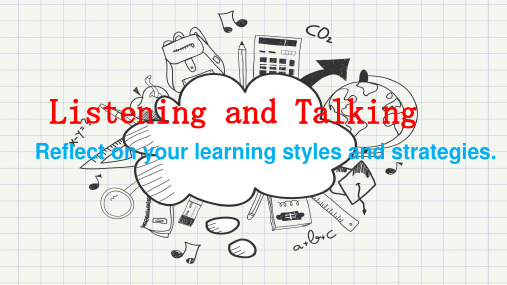
Listen to conversation and tick what Li Ming likes to do.
2024/9/4
9
Activity 1 Listen to conversation and tick what Li Ming likes to do.
make mind maps
思维导图
keep a learning diary
6
2024/9/4
7
Listening
听前
听中 听后
2024/9/4
What listening skills have we learnt?
关注关键信息 仔细读要求 预测内容 注意暗示 记下关键词
5w: who what when where why
2024/9/4
3
How do you usually learn English?
listen to the teacher take notes
pair work
2024/9/4
group work brainstorming
头脑风暴,集思广益
4
How do you usually learn English?
1. Why does Amy like group work? She’s an _o_u_t_g_o_in_g_ person, so she likes to __d_i_sc_u_s_s__th_i_n_g_s_. _T_a_lk_i_n_g_t_o_o_t_h_e_rs_ helps her remember things. 2. How does Li Ming organize his thoughts?
新人教高一英语必修一 课本听力与视频材料原文Unit1

新人教高一英语必修一课本听力与视频材料原文Unit1Teenage life listening and speaking Conversation 1Teacher: Shh! Listen carefully![3-second beep at about 40 kHz]Teacher: Did you hear that? No? How about this?[3-second beep at about 17.4 kHz]Teacher: If you couldn’t hear the first one, it means you're not a dog![Laugh]Dogs can hear very high frequency频率sounds, but people can't. And if you could hear the second one, you're younger than 25Student: Wow! Why is that?Teacher: Our ears change when we get older. Children and young people can hear the second one, but most people older than25 can’tConversation 2Teachers: Todays topic is “Should teenagers date” Team A, please begin.Team A: We say no, they shouldn’t. One reason is that teenagers are too young. They should think about schoolwork and spend more time studying .Team B: We don’t agree with Team A. Our answer is “Yes”.Teenagers can date if they want. It is quite natural for a teenager at that age to feel he or she likes somebody. We think it's possible for teenagers to date and study at the same time. Teacher: Team A?Conversation 3Julie: Hi, Adam! Are you going to join a club?Adam: Hi, Julie! Id like to, but I’m not sure which oneJulie: I think I will join the Ballet Club. It's always been my dream to be a dancer, and ballet has such beautiful movements. Adam:Oh, wow, dancing’s not for me---i've got two left feet! Mr Brown told me about the Nature Club. They watch biology lectures and grow plants in a greenhouse. I like animals, but I'm not so interested in plantsJulie: Did you hear about the Cartoon Club?Adam: Yes, I love cartoons! But what do they do in the club? Watch cartoons?Julie: No, they write stories and draw cartoons.Adam: Oh, no I'm not good at drawing. Besides, I’d like to do something outdoors.Julie: Max is in the Volunteer Club. He says that they mostly helpclean up parks and give directions to visitors. Why not talk to him?Listening and TalkingCao Jing: Hi, Max. What're you going to do this vacation?Max: I'm going to an adventure campCao Jing: Adventure camp? What're you going to do there?Max: We'll learn survival skills. For example, I'll learn how to makea fire. There'll be some experts there to show us how to live inthe wild. I think it's going to be funCao Jing: Cool.Max: What about you?Cao Jing: I’m going to an international youth camp. There’ll be lots of students from different countries.Max: Wow! What will you do there?Cao Jing: I'm not sure yet, but the topic is about teenagers and teenage life. I'm going to give a speech about student life in China.Max: Sounds interesting. What kind of stuff will you talk about? Cao Jing: Oh, teenage life, you know, study, relationships, dreams, plans……It's a bit of challenge, but a good chance. I plan to improve my spoken English.Max: Good for you. I hope you have lots of fun there, too.Cao Jing: Oh, definitely. I think it will be very interesting, and I hope to make some friends.Video TimeLearning Across GenerationsNarrator: Just outside Johannesburg, South Africa, the day begins for seventeen-year-old Mamorena Chaane. She’s a student at St.Mary's, a very expensive private school. Mamorena gets a greateducation here. In South Africa, many people leave school asteenagers, So Mamorena is a very lucky young woman.This is her mother, Tandi. She grew up in a poor area inJohannesburg. Today, she and her family live in the suburbs andshe is a successful businesswoman. But every week, Tandi takesMamorena to her old neighbourhood in Johannesburg. Tandi grewup here, and her life was very difficult.landi: This was a shanty town. This whole area was a shanty town. Narrator: Tandi shows Mamorena her childhood home. She wants Mamorena to learn about the past and about the poor today. ButMamorena doesn’t really understand. Her life is so different.Her family has a beautiful home.Mamorena: We're born on the same day.Narrator: And the house has a pool. It's very different from her mother’s childhood. In many ways, Mamorena is a typical teenager. Sheloves to go shopping.Landi:I want her to always remember who she is. Because I don't think you become a person if you don't know where you comefrom.Narrator: Now, Mamorena and her generation must work hard too, says Tandi。
高一英语跟读课文
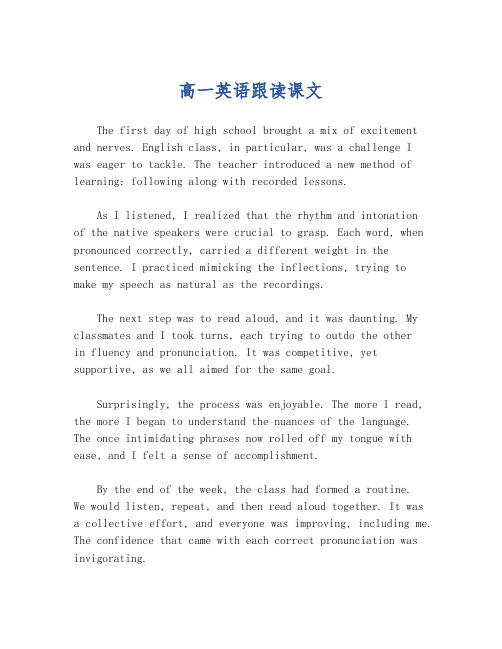
高一英语跟读课文The first day of high school brought a mix of excitement and nerves. English class, in particular, was a challenge I was eager to tackle. The teacher introduced a new method of learning: following along with recorded lessons.As I listened, I realized that the rhythm and intonationof the native speakers were crucial to grasp. Each word, when pronounced correctly, carried a different weight in the sentence. I practiced mimicking the inflections, trying to make my speech as natural as the recordings.The next step was to read aloud, and it was daunting. My classmates and I took turns, each trying to outdo the otherin fluency and pronunciation. It was competitive, yet supportive, as we all aimed for the same goal.Surprisingly, the process was enjoyable. The more I read, the more I began to understand the nuances of the language. The once intimidating phrases now rolled off my tongue with ease, and I felt a sense of accomplishment.By the end of the week, the class had formed a routine.We would listen, repeat, and then read aloud together. It was a collective effort, and everyone was improving, including me. The confidence that came with each correct pronunciation was invigorating.This method of learning has not only improved my English but also my listening skills. I've learned to appreciate the beauty of language and the importance of expressing oneself clearly.The teacher's feedback was always constructive, pushing us to strive for perfection. With each correction, I felt my skills sharpening, and my understanding deepening.Now, when I read the English texts, I can hear the words in my head as if the speaker was right beside me. It's askill that has made a significant difference in my language studies.In conclusion, the experience of following along with English recordings in my first year of high school has been transformative. It has not only enhanced my language proficiency but also my overall approach to learning.。
人教版高一至高三全部英语课文朗读与听力MP3链接

人教版高一至高三全部英语课文朗读与听力MP3下载!源资源已丢失,必须使用迅雷下载,直接把地址复制到任务栏内,不要直接点击进去/xazai/高一英语/workbook/workbookunit03.mp3/xazai/高一英语/workbook/workbookunit04.mp3/xazai/高一英语/workbook/workbookunit05.mp3/xazai/高一英语/workbook/workbookunit06.mp3/xazai/高一英语/workbook/workbookunit07.mp3/xazai/高一英语/workbook/workbookunit08.mp3/xazai/高一英语/workbook/workbookunit09.mp3/xazai/高一英语/workbook/workbookunit10.mp3/xazai/高一英语/workbook/workbookunit11.mp3/xazai/高一英语/workbook/workbookunit12.mp3******************高一英语上*****************/xazai/高一英语(上)/U10integrating%20skills.mp3/xazai/高一英语(上)/U10listening.mp3******************高一英语:******************/xazai/高一英语/U10integrating%20skills.mp3/xazai/高一英语/U10listening.mp3/xazai/高一英语/U10reading.mp3/xazai/高一英语/U10words.mp3/xazai/高一英语/U11integrating%20skills.mp3/xazai/高一英语/U11listening.mp3/xazai/高一英语/U11reading.mp3/xazai/高一英语/U11speaking.mp3/xazai/高一英语/U11warming%20up.mp3/xazai/高一英语/U11words.mp3/xazai/高一英语/U12integrating%20skills.mp3/xazai/高一英语/U12listening.mp3/xazai/高一英语/U12reading.mp3/xazai/高一英语/U12words.mp3/xazai/高一英语/U1intergrating%20skills.mp3/xazai/高一英语/U1listening.mp3/xazai/高一英语/U1reading.mp3/xazai/高一英语/U1speaking.mp3/xazai/高一英语/U1words.mp3/xazai/高一英语/U2intergrating%20skills.mp3/xazai/高一英语/U2listening.mp3/xazai/高一英语/U2reading.mp3/xazai/高一英语/U2speaking.mp3/xazai/高一英语/U2warming%20up.mp3/xazai/高一英语/U2words.mp3/xazai/高一英语/U3reading.mp3/xazai/高一英语/U3words.mp3/xazai/高一英语/U4intergrating%20skills.mp3 /xazai/高一英语/U4listening.mp3/xazai/高一英语/U4reading.mp3/xazai/高一英语/U4speaking.mp3/xazai/高一英语/U4words.mp3/xazai/高一英语/U5intergrating%20skills.mp3 /xazai/高一英语/U5listening.mp3/xazai/高一英语/U5reading.mp3/xazai/高一英语/U5speaking.mp3/xazai/高一英语/U5words.mp3/xazai/高一英语/U6intergrating%20skills.mp3 /xazai/高一英语/U6listening.mp3/xazai/高一英语/U6reading.mp3/xazai/高一英语/U6words.mp3/xazai/高一英语/U7intergrating%20skills.mp3 /xazai/高一英语/U7listening.mp3/xazai/高一英语/U7reading.mp3/xazai/高一英语/U7words.mp3/xazai/高一英语/U8intergrating%20skills.mp3 /xazai/高一英语/U8listening.mp3/xazai/高一英语/U8reading.mp3/xazai/高一英语/U8words.mp3/xazai/高一英语/U9integrating%20skills.mp3 /xazai/高一英语/U9listening.mp3/xazai/高一英语/U9reading.mp3/xazai/高一英语/U9words.mp3***************高一英语/workbook******************/xazai/高一英语/workbook/workbookunit01.mp3 /xazai/高一英语/workbook/workbookunit02.mp3/xazai/高一英语(上)/U10reading.mp3/xazai/高一英语(上)/U10words.mp3/xazai/高一英语(上)/U11integrating%20skills.mp3 /xazai/高一英语(上)/U11listening.mp3/xazai/高一英语(上)/U11reading.mp3/xazai/高一英语(上)/U11speaking.mp3/xazai/高一英语(上)/U11warming%20up.mp3/xazai/高一英语(上)/U11words.mp3/xazai/高一英语(上)/U12integrating%20skills.mp3 /xazai/高一英语(上)/U12listening.mp3/xazai/高一英语(上)/U12reading.mp3/xazai/高一英语(上)/U1intergrating%20skills.mp3 /xazai/高一英语(上)/U1listening.mp3/xazai/高一英语(上)/U1reading.mp3/xazai/高一英语(上)/U1speaking.mp3/xazai/高一英语(上)/U1words.mp3/xazai/高一英语(上)/U2intergrating%20skills.mp3 /xazai/高一英语(上)/U2listening.mp3/xazai/高一英语(上)/U2reading.mp3/xazai/高一英语(上)/U2speaking.mp3/xazai/高一英语(上)/U2warming%20up.mp3/xazai/高一英语(上)/U2words.mp3/xazai/高一英语(上)/U3listening.mp3/xazai/高一英语(上)/U3reading.mp3/xazai/高一英语(上)/U3words.mp3/xazai/高一英语(上)/U4intergrating%20skills.mp3 /xazai/高一英语(上)/U4listening.mp3/xazai/高一英语(上)/U4reading.mp3/xazai/高一英语(上)/U4speaking.mp3/xazai/高一英语(上)/U4words.mp3/xazai/高一英语(上)/U5intergrating%20skills.mp3 /xazai/高一英语(上)/U5listening.mp3/xazai/高一英语(上)/U5reading.mp3/xazai/高一英语(上)/U5speaking.mp3/xazai/高一英语(上)/U5words.mp3/xazai/高一英语(上)/U6intergrating%20skills.mp3 /xazai/高一英语(上)/U6listening.mp3/xazai/高一英语(上)/U6reading.mp3/xazai/高一英语(上)/U6words.mp3/xazai/高一英语(上)/U7intergrating%20skills.mp3 /xazai/高一英语(上)/U7listening.mp3/xazai/高一英语(上)/U7reading.mp3/xazai/高一英语(上)/U7words.mp3/xazai/高一英语(上)/U8intergrating%20skills.mp3 /xazai/高一英语(上)/U8listening.mp3/xazai/高一英语(上)/U8reading.mp3/xazai/高一英语(上)/U8words.mp3/xazai/高一英语(上)/U9integrating%20skills.mp3 /xazai/高一英语(上)/U9listening.mp3/xazai/高一英语(上)/U9reading.mp3/xazai/高一英语(上)/U9words.mp3*****************高一英语上/workbook***************/xazai/高一英语(上)/workbook/workbookunit01.mp3 /xazai/高一英语(上)/workbook/workbookunit02.mp3 /xazai/高一英语(上)/workbook/workbookunit03.mp3 /xazai/高一英语(上)/workbook/workbookunit04.mp3 /xazai/高一英语(上)/workbook/workbookunit05.mp3 /xazai/高一英语(上)/workbook/workbookunit06.mp3 /xazai/高一英语(上)/workbook/workbookunit07.mp3 /xazai/高一英语(上)/workbook/workbookunit08.mp3 /xazai/高一英语(上)/workbook/workbookunit09.mp3 /xazai/高一英语(上)/workbook/workbookunit10.mp3 /xazai/高一英语(上)/workbook/workbookunit11.mp3 /xazai/高一英语(上)/workbook/workbookunit12.mp3***************高一英语下**************/xazai/高一英语(下)/u13integrating%20skills.wma /xazai/高一英语(下)/u13listening(1).wma/xazai/高一英语(下)/u13reading.wma/xazai/高一英语(下)/u13speaking.wma/xazai/高一英语(下)/u13workbook.wma/xazai/高一英语(下)/u13workbooklistening.wma /xazai/高一英语(下)/u14integrating%20skills.wma /xazai/高一英语(下)/u14listening.wma/xazai/高一英语(下)/u14reading.wma/xazai/高一英语(下)/u14workbooklistening.wma /xazai/高一英语(下)/u15integrating%20skills.wma /xazai/高一英语(下)/u15listening.wma/xazai/高一英语(下)/u15reading.wma/xazai/高一英语(下)/u15workbook.wma/xazai/高一英语(下)/u15workbooklistening.wma /xazai/高一英语(下)/u16listening.wma/xazai/高一英语(下)/u16reading.wma/xazai/高一英语(下)/u16speaking.wma/xazai/高一英语(下)/u16workbook.wma/xazai/高一英语(下)/u16workbooklistening.wma /xazai/高一英语(下)/u17integrating%20skills.wma /xazai/高一英语(下)/u17listening.wma/xazai/高一英语(下)/u17reading.wma/xazai/高一英语(下)/u17workbook.wma/xazai/高一英语(下)/u17workbooklistening.wma /xazai/高一英语(下)/u18integrating%20skills.wma /xazai/高一英语(下)/u18listening.wma/xazai/高一英语(下)/u18reading.wma/xazai/高一英语(下)/u18speaking.wma/xazai/高一英语(下)/u18workbook.wma/xazai/高一英语(下)/u18workbooklistening.wma /xazai/高一英语(下)/u19integrating%20skills.wma /xazai/高一英语(下)/u19listening.wma/xazai/高一英语(下)/u19reading.wma/xazai/高一英语(下)/u19workbook.wma/xazai/高一英语(下)/u19workbooklistening.wma /xazai/高一英语(下)/u20integrating%20skills.wma /xazai/高一英语(下)/u20listening.wma/xazai/高一英语(下)/u20reading.wma/xazai/高一英语(下)/u20speaking.wma/xazai/高一英语(下)/u20workbook.wma/xazai/高一英语(下)/u20workbooklistening.wma /xazai/高一英语(下)/u21listening.wma/xazai/高一英语(下)/u21reading.wma/xazai/高一英语(下)/u21speaking.wma/xazai/高一英语(下)/u21workbook.wma/xazai/高一英语(下)/u21workbooklistening.wma /xazai/高一英语(下)/u22integrating%20skills.wma /xazai/高一英语(下)/u22listening.wma/xazai/高一英语(下)/u22reading.wma/xazai/高一英语(下)/u22speaking.wma/xazai/高一英语(下)/u22workbook.wma/xazai/高一英语(下)/u22workbooklistening.wma***********高二英语第二册*****************/xazai/高二英语第二册/听力-11-20/11-b.mp3/xazai/高二英语第二册/听力-11-20/11-l.mp3/xazai/高二英语第二册/听力-11-20/12-b.mp3/xazai/高二英语第二册/听力-11-20/12-l.mp3/xazai/高二英语第二册/听力-11-20/13-b.mp3/xazai/高二英语第二册/听力-11-20/13-l.mp3/xazai/高二英语第二册/听力-11-20/14-b.mp3/xazai/高二英语第二册/听力-11-20/14-l.mp3/xazai/高二英语第二册/听力-11-20/15-b.mp3/xazai/高二英语第二册/听力-11-20/15-l.mp3/xazai/高二英语第二册/听力-11-20/16-1.mp3/xazai/高二英语第二册/听力-11-20/16-2.mp3/xazai/高二英语第二册/听力-11-20/17-1.mp3/xazai/高二英语第二册/听力-11-20/17book.mp3 /xazai/高二英语第二册/听力-11-20/18-b.mp3/xazai/高二英语第二册/听力-11-20/18l-l.mp3 /xazai/高二英语第二册/听力-11-20/19-b.mp3/xazai/高二英语第二册/听力-11-20/19-l.mp3/xazai/高二英语第二册/听力-11-20/20-b.mp3/xazai/高二英语第二册/听力-11-20/20-l.mp3/xazai/高二英语第二册/朗读1-11-15/11-r.mp3/xazai/高二英语第二册/朗读1-11-15/11-work.mp3 /xazai/高二英语第二册/朗读1-11-15/11.mp3/xazai/高二英语第二册/朗读1-11-15/12-r.mp3/xazai/高二英语第二册/朗读1-11-15/12-work.mp3 /xazai/高二英语第二册/朗读1-11-15/12.mp3/xazai/高二英语第二册/朗读1-11-15/13-r.mp3/xazai/高二英语第二册/朗读1-11-15/13-work.mp3 /xazai/高二英语第二册/朗读1-11-15/13.mp3/xazai/高二英语第二册/朗读1-11-15/14-r.mp3/xazai/高二英语第二册/朗读1-11-15/14-work.mp3 /xazai/高二英语第二册/朗读1-11-15/14.mp3/xazai/高二英语第二册/朗读1-11-15/15-work.mp3 /xazai/高二英语第二册/朗读1-11-15/15.mp3/xazai/高二英语第二册/朗读1-11-15/154-r.mp3/xazai/高二英语第二册/朗读2-16-20/朗读2-16-1.mp3 /xazai/高二英语第二册/朗读2-16-20/朗读2-16-2.mp3 /xazai/高二英语第二册/朗读2-16-20/朗读2-16-3.mp3 /xazai/高二英语第二册/朗读2-16-20/朗读2-17-1`.mp3 /xazai/高二英语第二册/朗读2-16-20/朗读2-17-2.mp3 /xazai/高二英语第二册/朗读2-16-20/朗读2-17-3.mp3 /xazai/高二英语第二册/朗读2-16-20/朗读2-18-1.mp3 /xazai/高二英语第二册/朗读2-16-20/朗读2-18-2.mp3 /xazai/高二英语第二册/朗读2-16-20/朗读2-18-3.mp3 /xazai/高二英语第二册/朗读2-16-20/朗读2-19-1.mp3 /xazai/高二英语第二册/朗读2-16-20/朗读2-19-2.mp3 /xazai/高二英语第二册/朗读2-16-20/朗读2-19-3.mp3 /xazai/高二英语第二册/朗读2-16-20/朗读2-19-4.mp3 /xazai/高二英语第二册/朗读2-16-20/朗读2-20-1.mp3 /xazai/高二英语第二册/朗读2-16-20/朗读2-20-2.mp3 /xazai/高二英语第二册/朗读2-16-20/朗读2-20-3.mp3*****************高三英语*************/xazai/高三英语/NO3-U01intergrating%20skills.wma /xazai/高三英语/NO3-U01reading.wma/xazai/高三英语/NO3-U02intergrating%20skills.wma /xazai/高三英语/NO3-U02reading.wma/xazai/高三英语/NO3-U03intergrating%20skills.wma /xazai/高三英语/NO3-U03reading.wma/xazai/高三英语/NO3-U04intergrating%20skills.wma /xazai/高三英语/NO3-U04reading.wma/xazai/高三英语/NO3-U05intergrating%20skills.wma /xazai/高三英语/NO3-U05reading.wma/xazai/高三英语/NO3-U06intergrating%20skills.wma /xazai/高三英语/NO3-U06reading.wma/xazai/高三英语/NO3-U07intergrating%20skills.wma /xazai/高三英语/NO3-U07reading.wma/xazai/高三英语/NO3-U08intergrating%20skills.wma /xazai/高三英语/NO3-U08reading.wma/xazai/高三英语/NO3-U09intergrating%20skills.wma /xazai/高三英语/NO3-U09reading.wma/xazai/高三英语/NO3-U10intergrating%20skills.wma /xazai/高三英语/NO3-U10reading.wma/xazai/高三英语/NO3-U11intergrating%20skills.wma /xazai/高三英语/NO3-U11reading(1).wma/xazai/高三英语/NO3-U11reading(2).wma/xazai/高三英语/NO3-U12intergrating%20skills.wma /xazai/高三英语/NO3-U12reading(2).wma/xazai/高三英语/NO3-U12reading.wma/xazai/高三英语/NO3-U13-reading.wma/xazai/高三英语/NO3-U13intergrating%20skills.wma /xazai/高三英语/NO3-U13reading.wma/xazai/高三英语/NO3-U14-reading(2).wma/xazai/高三英语/NO3-U14-reading.wma/xazai/高三英语/NO3-U14intergrating%20skills.wma /xazai/高三英语/NO3-U14reading.wma/xazai/高三英语/NO3-U15-Reading.wma/xazai/高三英语/NO3-U15intergrating%20skills.wma /xazai/高三英语/NO3-U15reading.wma/xazai/高三英语/NO3-U16-Reading.wma/xazai/高三英语/NO3-U16intergrating%20skills.wma /xazai/高三英语/NO3-U16reading.wma/xazai/高三英语/NO3-workbookunit01.wma/xazai/高三英语/NO3-workbookunit02.wma/xazai/高三英语/NO3-workbookunit03.wma/xazai/高三英语/NO3-workbookunit04.wma/xazai/高三英语/NO3-workbookunit05.wma/xazai/高三英语/NO3-workbookunit06.wma/xazai/高三英语/NO3-workbookunit07.wma/xazai/高三英语/NO3-workbookunit08.wma/xazai/高三英语/NO3-workbookunit09.wma/xazai/高三英语/NO3-workbookunit10.wma/xazai/高三英语/NO3-workbookunit11-2.wma/xazai/高三英语/NO3-workbookunit11.wma/xazai/高三英语/NO3-workbookunit12.wma/xazai/高三英语/NO3-workbookunit13.wma/xazai/高三英语/NO3-workbookunit14.wma/xazai/高三英语/NO3-workbookunit15.wma/xazai/高三英语/NO3-workbookunit16.wma/xazai/高三英语/听力unit01-listening-2.wma/xazai/高三英语/听力unit01-listening.wma/xazai/高三英语/听力unit01-workbook-2.wma/xazai/高三英语/听力unit01-workbook-3.wma/xazai/高三英语/听力unit02-listening-2.wma/xazai/高三英语/听力unit02-workbook-listening-2.wma /xazai/高三英语/听力unit03-listening-2.wma/xazai/高三英语/听力unit03-listening-3.wma/xazai/高三英语/听力unit03-workbook-listening-2.wma /xazai/高三英语/听力unit03-workbook-listening-3.wma /xazai/高三英语/听力unit04-listening-4.wma/xazai/高三英语/听力unit04-workbook-2.wma/xazai/高三英语/听力unit05-listening-2-3.wma/xazai/高三英语/听力unit05-workbook-listening-2-3.wma /xazai/高三英语/听力unit06-listening-2.wma/xazai/高三英语/听力unit06-workbook-listening-2.wma /xazai/高三英语/听力unit07-listening-2.wma/xazai/高三英语/听力unit07-workbook-listening-2.wma /xazai/高三英语/听力unit08-listening-2-3.wma/xazai/高三英语/听力unit08-workbook-listening-2-3.wma /xazai/高三英语/听力unit09-listening-2-3.wma/xazai/高三英语/听力unit09-workbook-listening-2-3.wma /xazai/高三英语/听力unit10-listening-2.wma/xazai/高三英语/听力unit10-workbook-listening-2.wma /xazai/高三英语/听力unit11-listening-2.wma/xazai/高三英语/听力unit11-workbook-listening-1-2.wma /xazai/高三英语/听力unit12-listening-2.wma/xazai/高三英语/听力unit12-workbook-listening.wma /xazai/高三英语/听力unit13-listening-2.wma/xazai/高三英语/听力unit13-listening-3.wma/xazai/高三英语/听力unit13-workbook-listening-1-2.wma /xazai/高三英语/听力unit14-listening-2.wma/xazai/高三英语/听力unit14-workbook-listening-1-2.wma /xazai/高三英语/听力unit15-listening.wma/xazai/高三英语/听力unit15-workbook-listening-1-2.wma /xazai/高三英语/听力unit16-listening-3-4-5.wma/xazai/高三英语/听力unit16-workbook-listening-1-2.wma。
高中英语必修一unit1听说课听力材料
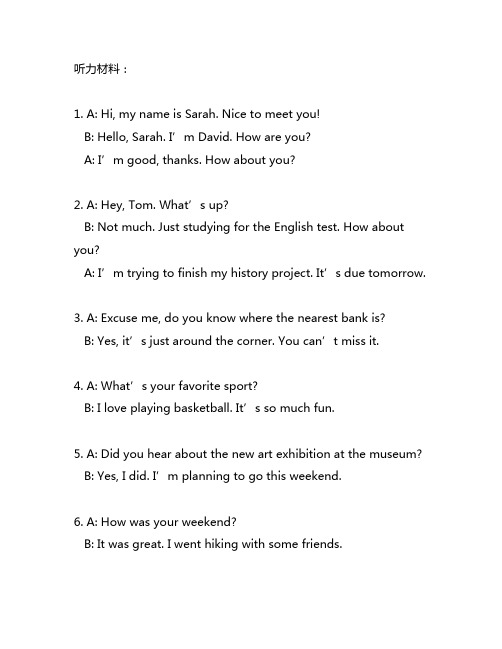
听力材料:1. A: Hi, my name is Sarah. Nice to meet you!B: Hello, Sarah. I’m David. How are you?A: I’m good, thanks. How about you?2. A: Hey, Tom. What’s up?B: Not much. Just studying for the English test. How about you?A: I’m trying to finish my history project. It’s due tomorrow.3. A: Excuse me, do you know where the nearest bank is?B: Yes, it’s just around the corner. You can’t miss it.4. A: What’s your favorite sport?B: I love playing basketball. It’s s o much fun.5. A: Did you hear about the new art exhibition at the museum? B: Yes, I did. I’m planning to go this weekend.6. A: How was your weekend?B: It was great. I went hiking with some friends.7. A: I can’t believe I lost my wallet.B: That’s terrible. Have you retraced your steps?8. A: Do you want to go to the movies tonight?B: I’d love to, but I have to study for the math test tomorrow.9. A: What do you want to be when you grow up?B: I want to be a doctor and help people.10. A: Where are you from?B: I’m from London, but I’ve been living in New York for the past few years.文章内容:高中英语必修一Unit1 听力课听力材料1. 介绍自己A同学自我介绍,B同学回应,并询问A同学近况。
高中英语下载地址

●高一英语课文朗读听力开始下载--------------------第20单元-----------→
/yingyu/人教版高一英语听力MP3/Unit20/u20listening.wma
/yingyu/人教版高二英语听力MP3/12-b.mp3
/yingyu/人教版高二英语听力MP3/12-l.mp3
/yingyu/人教版高二英语听力MP3/12-r.mp3
/search.php?key=%C8%CB%BD%CC%B0%E6%B8%DF%D6%D0%D3%A2%D3%EF%D1%A1%D0%DEmp3&format=rar
人教版高中高一高二高三英语朗读听力
发布: 2008-7-05 13:09 |编辑:david|
/yingyu/人教版高二英语听力MP3/13-l.mp3
/yingyu/人教版高二英语听力MP3/13-r.mp3
/yingyu/人教版高二英语听力MP3/13-work.mp3
/yingyu/人教版高一英语听力MP3/U4reading.mp3
/yingyu/人教版高一英语听力MP3/U5words.mp3
/yingyu/人教版高一英语听力MP3/U7words.mp3
●高一英语课文朗读听力开始下载-----------------→
/yingyu/人教版高一英语听力MP3/U1listening.mp3
/yingyu/人教版高一英语听力MP3/U1speaking.mp3
/yingyu/人教版高一英语听力MP3/U1reading.mp3
高中英语人教版必修1-5选修6-10的英语单词录音MP3
人教版高一英语必修一单词表(带音标)+mp3跟读朗读听力下载

人教版高一英语必修一单词表(带音标)+mp3跟读朗读听力下载下载地址本资料包含人教版高一英语必修一单词表,带音标,可打印;以及人教版高一英语必修一单词表配套mp3朗读领读听力录音音频。
单词举例Unit 2subwayn.地下人行道;<美>地铁['sʌbweɪ]Unit 2elevatorn.电梯;升降机['elɪveɪtə]Unit 2petroln.<英>汽油(=<美>gasoline)[ˈpetr(ə)l] Unit 2gasn.汽油;气体;煤气;毒气[ɡæs]Unit 2officialadj.官方的;正式的;公务的[əˈfɪʃ(ə)l]Unit 2voyagen.航行;航海[ˈvɒɪɪdʒ]Unit 2conquervt.征服;占领Unit 2because of因为;由于Unit 2nativen.本地人;本国人adj.本国的;本地的[ˈneɪtɪv]Unit 2Amyn.艾米(女名)Unit 2e up走近;上来;提出Unit 2apartmentn.<美>公寓住宅;单元住宅[əˈpɑːtmənt] Unit 2actuallyadv.实际上;事实上['æktjʊəli]Unit 2AD公元[æd]Unit 2basevt.以……为根据n.基部;基地;基础[beɪs] Unit 2at present现在;目前Unit 2gradualadj.逐渐的;逐步的[ˈgrædʒʊəl]Unit 2graduallyadv.逐渐地;逐步地[ˈɡrædjʊəli]Unit 2Danishn.丹麦语adj.丹麦的;丹麦人的;丹麦语的Unit 2enrichvt.使富裕;充实;改善Unit 2vocabularyn.词汇;词汇量;词表[vəˈkæbjʊləri] Unit 2Shakespeare莎士比亚(英国剧作家,诗人)Unit 2make use of利用;使用Unit 2spellingn.拼写;拼法[ˈspelɪŋ]Unit 2Samuel Johnson塞缪尔·约翰逊(英国作家,批评家)Unit 2Noah Webster诺厄·韦伯斯特(美国词典编纂家)Unit 2latteradj.较后的;后半的;(两者中)后者的[ˈlætə]Unit 2identityn.本身;本体;身份[aɪˈdentɪti]Unit 2fluentadj.流利的;流畅的[ˈfluːənt]Unit 2fluentlyadv.流利地;流畅地Unit 2Singapore新加坡(东南亚国家)[ˌsɪŋgəˌpɔː]Unit 2Malaysian.马来西亚(东南亚国家);马来群岛[mə'leɪʒə]Unit 2such as例如……;像这种的Unit 2frequentadj.频繁的;常见的[ˈfriːkwənt]Unit 2frequentlyadv.常常;频繁地Unit 2usagen.使用;用法;词语惯用法Unit 2mandn.&vt.命令;指令;掌握[kəˈmɑːnd]Unit 2requestn.&vt.请求;要求[rɪˈkwest]Unit 2dialectn.方言Unit 2expressionn.词语;表示;表达[ɪks'preʃən]Unit 2midwesternadj.中西部的;有中西部特性的Unit 2Africanadj.非洲的;非洲人的;非洲语言的[ˈæfrɪkən]Unit 2Spanishadj.西班牙的;西班牙人的;西班牙语的n.西班牙人;西班牙语[ˈspænɪʃ]Unit 2play a part (in)扮演一个角色;参与Unit 2easternadj.东方的;东部的[ˈiːst(ə)n]Unit 2southeasternadj.东南方的;来自东南的Unit 2northwesternadj.西北方的;来自西北的Unit 2recognizevt.辨认出;承认;公认[ˈrekəɡnaɪz]Unit 2lorryn.<英>卡车(=<美>truck)[ˈlɒri]Unit 2Lorin.罗丽(女名)Unit 2Houstonn.休斯顿(美国城市)Unit 2Texasn.德克萨斯州(美国州名)[ˈteksəs]Unit 2accentn.口音;腔调;重音[ˈæksənt]Unit 2Bufordn.布福德(姓氏;男名)Unit 2Lestern.莱斯特(姓氏;男名)Unit 2catfishn.鲶鱼Unit 2lightningn.闪电[ˈlaɪtnɪŋ]Unit 2straightadv.直接;挺直adj.直的;笔直的;正直的[streɪt]Unit 2blockn.街区;块;木块;石块[blɒk]Unit 2cabn.出租车[kæb]Unit 3journaln.日记;杂志;定期刊物['dʒɜːnəl]Unit 3transportn.运送;运输vt.运送;运输[trænsˈpɔːt]Unit 3prefervt.更喜欢;选择某事物(而不选择其他事物)[prɪ'fɜː]Unit 3disadvantagen.不利条件;不便之处[dɪsədˈvɑːntɪdʒ]Unit 3faren.费用[feə]Unit 3routen.路线;路途[ruːt]Unit 3Mekongn.湄公河Unit 3flowvi.流动;流出n.流动;流量[fləʊ]Unit 3ever since从那以后Unit 3persuadevt.说服;劝说[ˈpɜːsənəli]Unit 3cyclevi.骑自行车[ˈsaɪk(ə)l]Unit 3graduatevi.毕业n.大学毕业生['grædjʊeɪt] Unit 3finallyadv.最后;终于['faɪnəli]Unit 3schedulen.时间表;进度表vt.为某事安排时间[ˈʃedjuːl]Unit 3fondadj.喜爱的;慈爱的;宠爱的[fɒnd]Unit 3be fond of喜爱;喜欢Unit 3shortingn.缺点[ˈʃɔːtkʌmɪŋ]Unit 3stubbornadj.顽固的;固执的[ˈstʌbən]Unit 3organizevt.组织;成立[ˈɔːgənaɪz]Unit 3care about关心;忧虑;惦念Unit 3detailn.细节;详情[ˈdiːteɪl]Unit 3sourcen.来源;水源[sɔːs]Unit 3determinevt.决定;确定;下定决心[dɪˈtɜːmɪn]Unit 3determinedadj.坚决的;有决心的Unit 3change one's mind改变注意Unit 3journeyn.旅行;旅程['dʒɜːni]Unit 3altituden.海拔高度;高处[ˈæltɪtjuːd]Unit 3make up one's mind下决心;决定Unit 3give in投降;屈服;让步Unit 3atlasn.地图;地图集Unit 3glaciern.冰河;冰川Unit 3Tibetanadj.西藏的;藏族的;藏族人的n.(西)藏语;西藏认;藏族人Unit 3rapidsn.急流Unit 3valleyn.(山)谷;流域[ˈvæli]Unit 3waterfalln.瀑布Unit 3pacevi.缓慢而行;踱步n.一步;速度;步调[peɪs]Unit 3bendn.弯;拐角vt.(bent,bent)使弯曲[bend]Unit 3meandern.(指河流等)蜿蜒缓慢流动Unit 3deltan.三角州['deltə]Unit 3attituden.态度;看法[ˈætɪtjuːd]Unit 3Qomolangman.珠穆朗玛峰Unit 3boilvi.(指液体)沸腾;(水)开[bɒɪl]Unit 3forecastn.&vt.预测;预报[ˈfɔːkɑːst]Unit 3parceln.小包;包裹[ˈpɑːs(ə)l]Unit 3insurancen.保险[ɪnˈʃʊərəns]Unit 3wooln.羊毛;毛织品[wʊl]Unit 3as usual照常[əz'juːʒʊəl]Unit 3reliableadj.可信赖的;可靠的[rɪˈlaɪəb(ə)l]Unit 3viewn.风景;视野;观点;见解vt.观看;注视;考虑[vjuː]Unit 3yakn.牦牛Unit 3pillown.枕头;枕垫[pɪl]Unit 3midnightn.午夜;子夜['mɪdnaɪt]Unit 3at midnight在午夜Unit 3flamen.火焰;光芒;热情[fleɪm]Unit 3beneathprep.在……下面[bɪˈniːθ]Unit 3Laosn.老挝(东南亚国家)Unit 3Laotiann.老挝人adj.老挝(人)的Unit 3templen.庙宇;寺庙[ˈtemp(ə)l]Unit 3caven.洞穴;地窖[keɪv]。
- 1、下载文档前请自行甄别文档内容的完整性,平台不提供额外的编辑、内容补充、找答案等附加服务。
- 2、"仅部分预览"的文档,不可在线预览部分如存在完整性等问题,可反馈申请退款(可完整预览的文档不适用该条件!)。
- 3、如文档侵犯您的权益,请联系客服反馈,我们会尽快为您处理(人工客服工作时间:9:00-18:30)。
人教版高一至高三全部英语课文朗读与听力MP3下载!源资源已丢失,必须使用迅雷下载,直接把地址复制到任务栏内,不要直接点击进去/xazai/高一英语/workbook/workbookunit03.mp3/xazai/高一英语/workbook/workbookunit04.mp3/xazai/高一英语/workbook/workbookunit05.mp3/xazai/高一英语/workbook/workbookunit06.mp3/xazai/高一英语/workbook/workbookunit07.mp3/xazai/高一英语/workbook/workbookunit08.mp3/xazai/高一英语/workbook/workbookunit09.mp3/xazai/高一英语/workbook/workbookunit10.mp3/xazai/高一英语/workbook/workbookunit11.mp3/xazai/高一英语/workbook/workbookunit12.mp3******************高一英语上*****************/xazai/高一英语(上)/U10integrating%20skills.mp3/xazai/高一英语(上)/U10listening.mp3******************高一英语:******************/xazai/高一英语/U10integrating%20skills.mp3/xazai/高一英语/U10listening.mp3/xazai/高一英语/U10reading.mp3/xazai/高一英语/U10words.mp3/xazai/高一英语/U11integrating%20skills.mp3/xazai/高一英语/U11listening.mp3/xazai/高一英语/U11reading.mp3/xazai/高一英语/U11speaking.mp3/xazai/高一英语/U11warming%20up.mp3/xazai/高一英语/U11words.mp3/xazai/高一英语/U12integrating%20skills.mp3/xazai/高一英语/U12listening.mp3/xazai/高一英语/U12reading.mp3/xazai/高一英语/U12words.mp3/xazai/高一英语/U1intergrating%20skills.mp3/xazai/高一英语/U1listening.mp3/xazai/高一英语/U1reading.mp3/xazai/高一英语/U1speaking.mp3/xazai/高一英语/U1words.mp3/xazai/高一英语/U2intergrating%20skills.mp3/xazai/高一英语/U2listening.mp3/xazai/高一英语/U2reading.mp3/xazai/高一英语/U2speaking.mp3/xazai/高一英语/U2warming%20up.mp3/xazai/高一英语/U2words.mp3/xazai/高一英语/U3listening.mp3/xazai/高一英语/U3reading.mp3/xazai/高一英语/U3words.mp3/xazai/高一英语/U4intergrating%20skills.mp3 /xazai/高一英语/U4listening.mp3/xazai/高一英语/U4reading.mp3/xazai/高一英语/U4speaking.mp3/xazai/高一英语/U4words.mp3/xazai/高一英语/U5intergrating%20skills.mp3 /xazai/高一英语/U5listening.mp3/xazai/高一英语/U5reading.mp3/xazai/高一英语/U5speaking.mp3/xazai/高一英语/U5words.mp3/xazai/高一英语/U6intergrating%20skills.mp3 /xazai/高一英语/U6listening.mp3/xazai/高一英语/U6reading.mp3/xazai/高一英语/U6words.mp3/xazai/高一英语/U7intergrating%20skills.mp3 /xazai/高一英语/U7listening.mp3/xazai/高一英语/U7reading.mp3/xazai/高一英语/U7words.mp3/xazai/高一英语/U8intergrating%20skills.mp3 /xazai/高一英语/U8listening.mp3/xazai/高一英语/U8reading.mp3/xazai/高一英语/U8words.mp3/xazai/高一英语/U9integrating%20skills.mp3 /xazai/高一英语/U9listening.mp3/xazai/高一英语/U9reading.mp3/xazai/高一英语/U9words.mp3***************高一英语/workbook******************/xazai/高一英语/workbook/workbookunit01.mp3 /xazai/高一英语/workbook/workbookunit02.mp3/xazai/高一英语(上)/U10reading.mp3/xazai/高一英语(上)/U10words.mp3/xazai/高一英语(上)/U11integrating%20skills.mp3 /xazai/高一英语(上)/U11listening.mp3/xazai/高一英语(上)/U11reading.mp3/xazai/高一英语(上)/U11speaking.mp3/xazai/高一英语(上)/U11warming%20up.mp3 /xazai/高一英语(上)/U11words.mp3/xazai/高一英语(上)/U12integrating%20skills.mp3 /xazai/高一英语(上)/U12listening.mp3/xazai/高一英语(上)/U12reading.mp3/xazai/高一英语(上)/U12words.mp3/xazai/高一英语(上)/U1intergrating%20skills.mp3 /xazai/高一英语(上)/U1listening.mp3/xazai/高一英语(上)/U1reading.mp3/xazai/高一英语(上)/U1speaking.mp3/xazai/高一英语(上)/U1words.mp3/xazai/高一英语(上)/U2intergrating%20skills.mp3 /xazai/高一英语(上)/U2listening.mp3/xazai/高一英语(上)/U2reading.mp3/xazai/高一英语(上)/U2speaking.mp3/xazai/高一英语(上)/U2warming%20up.mp3/xazai/高一英语(上)/U2words.mp3/xazai/高一英语(上)/U3listening.mp3/xazai/高一英语(上)/U3reading.mp3/xazai/高一英语(上)/U3words.mp3/xazai/高一英语(上)/U4intergrating%20skills.mp3 /xazai/高一英语(上)/U4listening.mp3/xazai/高一英语(上)/U4reading.mp3/xazai/高一英语(上)/U4speaking.mp3/xazai/高一英语(上)/U4words.mp3/xazai/高一英语(上)/U5intergrating%20skills.mp3 /xazai/高一英语(上)/U5listening.mp3/xazai/高一英语(上)/U5reading.mp3/xazai/高一英语(上)/U5speaking.mp3/xazai/高一英语(上)/U5words.mp3/xazai/高一英语(上)/U6intergrating%20skills.mp3 /xazai/高一英语(上)/U6listening.mp3/xazai/高一英语(上)/U6reading.mp3/xazai/高一英语(上)/U6words.mp3/xazai/高一英语(上)/U7intergrating%20skills.mp3 /xazai/高一英语(上)/U7listening.mp3/xazai/高一英语(上)/U7reading.mp3/xazai/高一英语(上)/U7words.mp3/xazai/高一英语(上)/U8intergrating%20skills.mp3 /xazai/高一英语(上)/U8listening.mp3/xazai/高一英语(上)/U8reading.mp3/xazai/高一英语(上)/U8words.mp3/xazai/高一英语(上)/U9integrating%20skills.mp3 /xazai/高一英语(上)/U9listening.mp3/xazai/高一英语(上)/U9reading.mp3/xazai/高一英语(上)/U9words.mp3*****************高一英语上/workbook***************/xazai/高一英语(上)/workbook/workbookunit01.mp3 /xazai/高一英语(上)/workbook/workbookunit02.mp3 /xazai/高一英语(上)/workbook/workbookunit03.mp3 /xazai/高一英语(上)/workbook/workbookunit04.mp3 /xazai/高一英语(上)/workbook/workbookunit05.mp3 /xazai/高一英语(上)/workbook/workbookunit06.mp3/xazai/高一英语(上)/workbook/workbookunit07.mp3 /xazai/高一英语(上)/workbook/workbookunit08.mp3 /xazai/高一英语(上)/workbook/workbookunit09.mp3 /xazai/高一英语(上)/workbook/workbookunit10.mp3 /xazai/高一英语(上)/workbook/workbookunit11.mp3 /xazai/高一英语(上)/workbook/workbookunit12.mp3***************高一英语下**************/xazai/高一英语(下)/u13integrating%20skills.wma /xazai/高一英语(下)/u13listening(1).wma/xazai/高一英语(下)/u13reading.wma/xazai/高一英语(下)/u13speaking.wma/xazai/高一英语(下)/u13workbook.wma/xazai/高一英语(下)/u13workbooklistening.wma /xazai/高一英语(下)/u14integrating%20skills.wma /xazai/高一英语(下)/u14listening.wma/xazai/高一英语(下)/u14reading.wma/xazai/高一英语(下)/u14workbooklistening.wma /xazai/高一英语(下)/u15integrating%20skills.wma /xazai/高一英语(下)/u15listening.wma/xazai/高一英语(下)/u15reading.wma/xazai/高一英语(下)/u15workbook.wma/xazai/高一英语(下)/u15workbooklistening.wma /xazai/高一英语(下)/u16listening.wma/xazai/高一英语(下)/u16reading.wma/xazai/高一英语(下)/u16speaking.wma/xazai/高一英语(下)/u16workbook.wma/xazai/高一英语(下)/u16workbooklistening.wma /xazai/高一英语(下)/u17integrating%20skills.wma /xazai/高一英语(下)/u17listening.wma/xazai/高一英语(下)/u17reading.wma/xazai/高一英语(下)/u17workbook.wma/xazai/高一英语(下)/u17workbooklistening.wma /xazai/高一英语(下)/u18integrating%20skills.wma /xazai/高一英语(下)/u18listening.wma/xazai/高一英语(下)/u18reading.wma/xazai/高一英语(下)/u18speaking.wma/xazai/高一英语(下)/u18workbook.wma/xazai/高一英语(下)/u18workbooklistening.wma /xazai/高一英语(下)/u19integrating%20skills.wma /xazai/高一英语(下)/u19listening.wma/xazai/高一英语(下)/u19reading.wma/xazai/高一英语(下)/u19workbook.wma/xazai/高一英语(下)/u19workbooklistening.wma /xazai/高一英语(下)/u20integrating%20skills.wma /xazai/高一英语(下)/u20listening.wma/xazai/高一英语(下)/u20reading.wma/xazai/高一英语(下)/u20speaking.wma/xazai/高一英语(下)/u20workbook.wma/xazai/高一英语(下)/u20workbooklistening.wma /xazai/高一英语(下)/u21listening.wma/xazai/高一英语(下)/u21reading.wma/xazai/高一英语(下)/u21speaking.wma/xazai/高一英语(下)/u21workbook.wma/xazai/高一英语(下)/u21workbooklistening.wma /xazai/高一英语(下)/u22integrating%20skills.wma /xazai/高一英语(下)/u22listening.wma/xazai/高一英语(下)/u22reading.wma/xazai/高一英语(下)/u22speaking.wma/xazai/高一英语(下)/u22workbook.wma/xazai/高一英语(下)/u22workbooklistening.wma***********高二英语第二册*****************/xazai/高二英语第二册/听力-11-20/11-b.mp3 /xazai/高二英语第二册/听力-11-20/11-l.mp3 /xazai/高二英语第二册/听力-11-20/12-b.mp3 /xazai/高二英语第二册/听力-11-20/12-l.mp3 /xazai/高二英语第二册/听力-11-20/13-b.mp3 /xazai/高二英语第二册/听力-11-20/13-l.mp3 /xazai/高二英语第二册/听力-11-20/14-b.mp3 /xazai/高二英语第二册/听力-11-20/14-l.mp3 /xazai/高二英语第二册/听力-11-20/15-b.mp3 /xazai/高二英语第二册/听力-11-20/15-l.mp3 /xazai/高二英语第二册/听力-11-20/16-1.mp3 /xazai/高二英语第二册/听力-11-20/16-2.mp3 /xazai/高二英语第二册/听力-11-20/17-1.mp3 /xazai/高二英语第二册/听力-11-20/17book.mp3 /xazai/高二英语第二册/听力-11-20/18-b.mp3 /xazai/高二英语第二册/听力-11-20/18l-l.mp3 /xazai/高二英语第二册/听力-11-20/19-b.mp3 /xazai/高二英语第二册/听力-11-20/19-l.mp3 /xazai/高二英语第二册/听力-11-20/20-b.mp3 /xazai/高二英语第二册/听力-11-20/20-l.mp3 /xazai/高二英语第二册/朗读1-11-15/11-r.mp3 /xazai/高二英语第二册/朗读1-11-15/11-work.mp3 /xazai/高二英语第二册/朗读1-11-15/11.mp3 /xazai/高二英语第二册/朗读1-11-15/12-r.mp3 /xazai/高二英语第二册/朗读1-11-15/12-work.mp3 /xazai/高二英语第二册/朗读1-11-15/12.mp3 /xazai/高二英语第二册/朗读1-11-15/13-r.mp3 /xazai/高二英语第二册/朗读1-11-15/13-work.mp3 /xazai/高二英语第二册/朗读1-11-15/13.mp3 /xazai/高二英语第二册/朗读1-11-15/14-r.mp3 /xazai/高二英语第二册/朗读1-11-15/14-work.mp3/xazai/高二英语第二册/朗读1-11-15/14.mp3/xazai/高二英语第二册/朗读1-11-15/15-work.mp3 /xazai/高二英语第二册/朗读1-11-15/15.mp3/xazai/高二英语第二册/朗读1-11-15/154-r.mp3/xazai/高二英语第二册/朗读2-16-20/朗读2-16-1.mp3 /xazai/高二英语第二册/朗读2-16-20/朗读2-16-2.mp3 /xazai/高二英语第二册/朗读2-16-20/朗读2-16-3.mp3 /xazai/高二英语第二册/朗读2-16-20/朗读2-17-1`.mp3 /xazai/高二英语第二册/朗读2-16-20/朗读2-17-2.mp3 /xazai/高二英语第二册/朗读2-16-20/朗读2-17-3.mp3 /xazai/高二英语第二册/朗读2-16-20/朗读2-18-1.mp3 /xazai/高二英语第二册/朗读2-16-20/朗读2-18-2.mp3 /xazai/高二英语第二册/朗读2-16-20/朗读2-18-3.mp3 /xazai/高二英语第二册/朗读2-16-20/朗读2-19-1.mp3 /xazai/高二英语第二册/朗读2-16-20/朗读2-19-2.mp3 /xazai/高二英语第二册/朗读2-16-20/朗读2-19-3.mp3 /xazai/高二英语第二册/朗读2-16-20/朗读2-19-4.mp3 /xazai/高二英语第二册/朗读2-16-20/朗读2-20-1.mp3 /xazai/高二英语第二册/朗读2-16-20/朗读2-20-2.mp3 /xazai/高二英语第二册/朗读2-16-20/朗读2-20-3.mp3*****************高三英语*************/xazai/高三英语/NO3-U01intergrating%20skills.wma /xazai/高三英语/NO3-U01reading.wma/xazai/高三英语/NO3-U02intergrating%20skills.wma /xazai/高三英语/NO3-U02reading.wma/xazai/高三英语/NO3-U03intergrating%20skills.wma /xazai/高三英语/NO3-U03reading.wma/xazai/高三英语/NO3-U04intergrating%20skills.wma /xazai/高三英语/NO3-U04reading.wma/xazai/高三英语/NO3-U05intergrating%20skills.wma /xazai/高三英语/NO3-U05reading.wma/xazai/高三英语/NO3-U06intergrating%20skills.wma /xazai/高三英语/NO3-U06reading.wma/xazai/高三英语/NO3-U07intergrating%20skills.wma /xazai/高三英语/NO3-U07reading.wma/xazai/高三英语/NO3-U08intergrating%20skills.wma /xazai/高三英语/NO3-U08reading.wma/xazai/高三英语/NO3-U09intergrating%20skills.wma /xazai/高三英语/NO3-U09reading.wma/xazai/高三英语/NO3-U10intergrating%20skills.wma /xazai/高三英语/NO3-U10reading.wma/xazai/高三英语/NO3-U11intergrating%20skills.wma /xazai/高三英语/NO3-U11reading(1).wma/xazai/高三英语/NO3-U11reading(2).wma/xazai/高三英语/NO3-U12intergrating%20skills.wma /xazai/高三英语/NO3-U12reading(2).wma/xazai/高三英语/NO3-U12reading.wma/xazai/高三英语/NO3-U13-reading.wma/xazai/高三英语/NO3-U13intergrating%20skills.wma /xazai/高三英语/NO3-U13reading.wma/xazai/高三英语/NO3-U14-reading(2).wma/xazai/高三英语/NO3-U14-reading.wma/xazai/高三英语/NO3-U14intergrating%20skills.wma /xazai/高三英语/NO3-U14reading.wma/xazai/高三英语/NO3-U15-Reading.wma/xazai/高三英语/NO3-U15intergrating%20skills.wma /xazai/高三英语/NO3-U15reading.wma/xazai/高三英语/NO3-U16-Reading.wma/xazai/高三英语/NO3-U16intergrating%20skills.wma /xazai/高三英语/NO3-U16reading.wma/xazai/高三英语/NO3-workbookunit01.wma/xazai/高三英语/NO3-workbookunit02.wma/xazai/高三英语/NO3-workbookunit03.wma/xazai/高三英语/NO3-workbookunit04.wma/xazai/高三英语/NO3-workbookunit05.wma/xazai/高三英语/NO3-workbookunit06.wma/xazai/高三英语/NO3-workbookunit07.wma/xazai/高三英语/NO3-workbookunit08.wma/xazai/高三英语/NO3-workbookunit09.wma/xazai/高三英语/NO3-workbookunit10.wma/xazai/高三英语/NO3-workbookunit11-2.wma/xazai/高三英语/NO3-workbookunit11.wma/xazai/高三英语/NO3-workbookunit12.wma/xazai/高三英语/NO3-workbookunit13.wma/xazai/高三英语/NO3-workbookunit14.wma/xazai/高三英语/NO3-workbookunit15.wma/xazai/高三英语/NO3-workbookunit16.wma/xazai/高三英语/听力unit01-listening-2.wma/xazai/高三英语/听力unit01-listening.wma/xazai/高三英语/听力unit01-workbook-2.wma/xazai/高三英语/听力unit01-workbook-3.wma/xazai/高三英语/听力unit02-listening-2.wma/xazai/高三英语/听力unit02-workbook-listening-2.wma /xazai/高三英语/听力unit03-listening-2.wma/xazai/高三英语/听力unit03-listening-3.wma/xazai/高三英语/听力unit03-workbook-listening-2.wma /xazai/高三英语/听力unit03-workbook-listening-3.wma /xazai/高三英语/听力unit04-listening-4.wma/xazai/高三英语/听力unit04-workbook-2.wma/xazai/高三英语/听力unit05-listening-2-3.wma/xazai/高三英语/听力unit05-workbook-listening-2-3.wma /xazai/高三英语/听力unit06-listening-2.wma/xazai/高三英语/听力unit06-workbook-listening-2.wma /xazai/高三英语/听力unit07-listening-2.wma/xazai/高三英语/听力unit07-workbook-listening-2.wma /xazai/高三英语/听力unit08-listening-2-3.wma/xazai/高三英语/听力unit08-workbook-listening-2-3.wma /xazai/高三英语/听力unit09-listening-2-3.wma/xazai/高三英语/听力unit09-workbook-listening-2-3.wma /xazai/高三英语/听力unit10-listening-2.wma/xazai/高三英语/听力unit10-workbook-listening-2.wma /xazai/高三英语/听力unit11-listening-2.wma/xazai/高三英语/听力unit11-workbook-listening-1-2.wma /xazai/高三英语/听力unit12-listening-2.wma/xazai/高三英语/听力unit12-workbook-listening.wma /xazai/高三英语/听力unit13-listening-2.wma/xazai/高三英语/听力unit13-listening-3.wma/xazai/高三英语/听力unit13-workbook-listening-1-2.wma /xazai/高三英语/听力unit14-listening-2.wma/xazai/高三英语/听力unit14-workbook-listening-1-2.wma /xazai/高三英语/听力unit15-listening.wma/xazai/高三英语/听力unit15-workbook-listening-1-2.wma /xazai/高三英语/听力unit16-listening-3-4-5.wma/xazai/高三英语/听力unit16-workbook-listening-1-2.wma。
